



1st inning
A week beside the anxiety and excitement of baseball players within arm's length of the call they all want, but only few can get.
1st inning
A week beside the anxiety and excitement of baseball players within arm's length of the call they all want, but only few can get.
Sitting in the near end of the dugout, George Schaefer and his coaching staff weren’t very optimistic about the evening practice. The tarp, unrolled across the infield earlier in the day was glazed with the afternoon rainfall. With the grass still slick, the need for practice wasn't worth the injury risk with the season opener two days away. And mother nature didn’t seem to be done yet. Beyond the outfield wall and out past the rolling cow fields, storm clouds were hanging low in a thick and white fog that spilled over the spine of Massanutten Mountain like a foamy ballpark beer. The forecast for the night was less than stellar and the return of the hypnotic sound of rain on the dugout's aluminum roof wasn’t a matter of if but when. But for this moment, the afternoon had provided a window-as small as it was-without rain. Rebel Park found itself sandwiched between two large weather systems, one on its way out, and the other making its way in from the west.
Out in left field, just past where infield dirt meets outfield grass, PJ DeMeo waggled a broomstick over his shoulder with his knees bent staring at the pitcher. Roberto Rivera, lobbed a tennis ball over the baseball glove doubling as home plate on their makeshift diamond. And as PJ shifted his weight to his back foot, he took a swing, stroking the ball back up the middle just like he’s done thousands of times before. Itching to play ball-it didn’t matter what form it was-the young men hand-picked to play in a Rebels uniform this summer had broken out a spontaneous game of stickball while they waited on the verdict of the evening practice. They had hopes of one day playing a boy’s game for a man’s paycheck, but tonight’s game was a reversion to their childhood. When the coaches canceled practice, it didn’t dampen the enthusiasm of the young ballplayers who were just excited to be here. The New Market Rebels, one of the flagship ball clubs of the 119 year-old Valley Baseball League, in this small Virginia town for the summer, were playing ball. For the rest of the summer they'll be living and breathing just baseball. It will be without the worry that comes with their college teams, and it will be in a small town they-and many others-have never heard of.
For 377 miles, Interstate 81 is an asphalt ribbon winding through Virginia's Shenandoah Valley. Its huge swaths of farmland line both sides of the highway dotted with livestock, poultry houses and sprinkler systems stretching across huge alfalfa fields. 81 unrolls through, over and around the Blue Ridge Mountains, a sub-section of the Appalachian Mountains. A large portion of the interstate cuts through central Virginia, the Holy Grail for leaf watchers and Civil War buffs. It lines the Valley’s floor, yielding an endless convoy of semi trucks, the bane of existence for locals, but a necessary evil to move it’s agricultural output across the lower 48.
Tucked into these towns off the interstate is a love affair with baseball. The closest Major League ballpark is nearly two hours away, but the distance between these players and the big leagues is defined by how far they will go to get noticed. In the Shenandoah Valley, the All-American game is played in All-American towns like Strasburg, where Strasburg Express baseball rules until the summer heat is snapped by football practice at Strasburg High School. Towns like Covington, home of the Lumberjacks, are situated on the western edge of the state along the banks of the Jackson River. For 119 years, the Valley Baseball League, one of the nation’s oldest collegiate summer baseball leagues, has been an anchor in these towns. For the college ballplayers lucky enough to earn an invitation to play, it is the incubator of baseball dreams. Despite its modest roots, no pay, and small town charm, a roster spot in the Valley Baseball League is not easy to get. Thousands would love to suit up, but only a few get the invitation. From the valley’s north end in Winchester, home of the 4-time champion Winchester Royals to the Staunton Braves in the south, this is where nearly 300 ball players from all corners of the country will come in hopes of fixing their swing, tweaking their fastball, and most importantly, catching the eyes of grizzled major league scouts who mine these ballparks for the next five-tool star.
The ballparks of the Valley Baseball League are modest, where capacity crowds hover in the low three digits, and double as high school fields during the spring season. Stadium lights reach high into the sky and pitchers often throw against a bright backdrop of the town’s summertime carnivals and fireworks. There is no pay here, the compensation is the chance to be seen and the prestige that comes with earning an invitation to play. They will be scattered across homes in each town, with volunteers happy to accommodate guys who might be the next Clayton Kershaw or Mike Trout.
On opening night of the 2015 Major League Baseball season, there were 30 players across the Major Leagues who had made their way through the Valley Baseball League. In 2008, 79 players selected in the Major League Baseball draft were Valley League alumni, a testament to the league’s quality of play and attention it gets from local scouts. The message in this league is direct and understood when they are selected to play. You can get noticed, and if you’re good, you will. Over the years, for thousands of college baseball players, the Valley Baseball League has been where the chance to continue playing professionally continues living. But for most, it’s where the baseball gods decide, without notice or warning that the road to a baseball career will abruptly end.


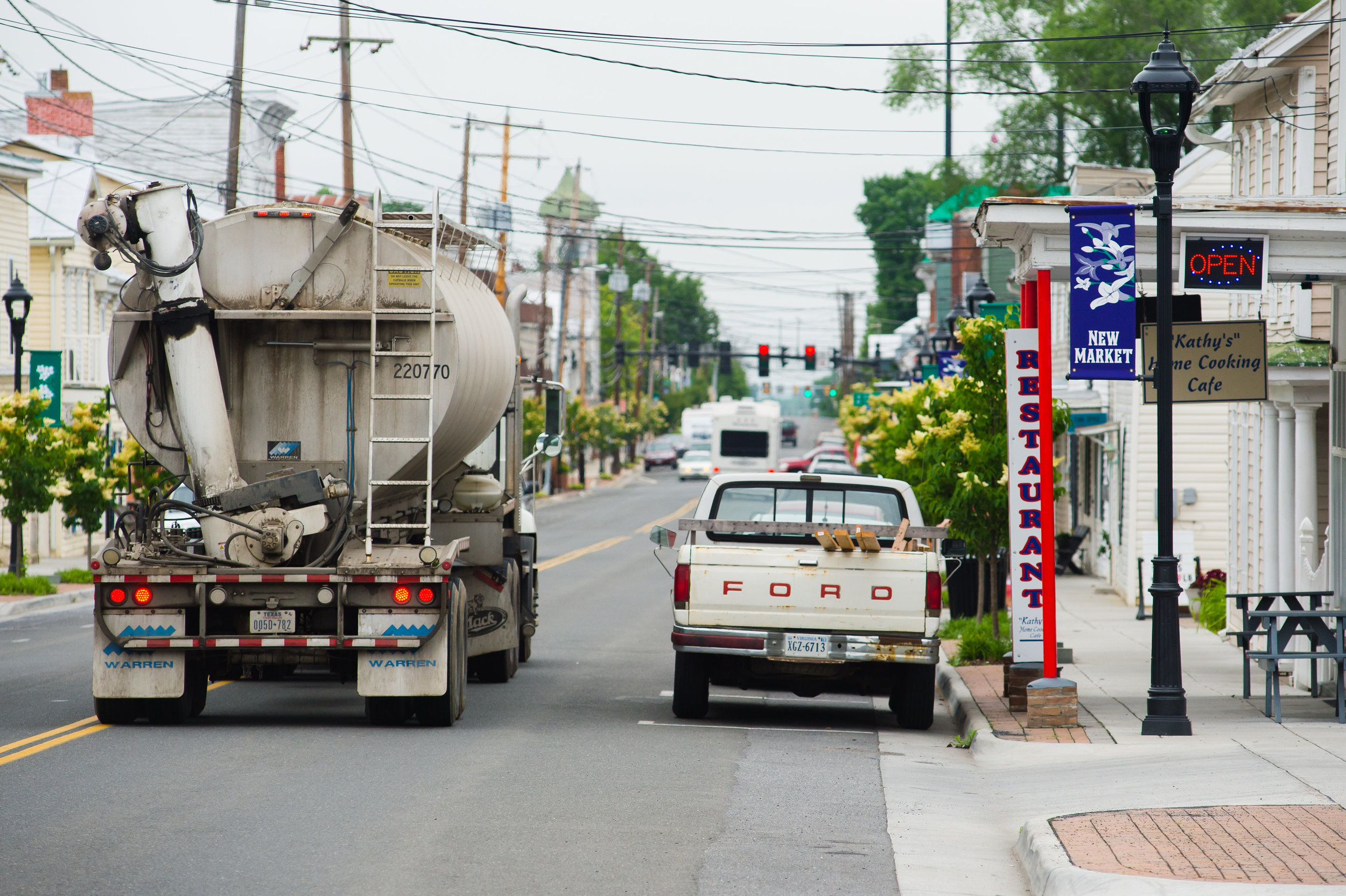
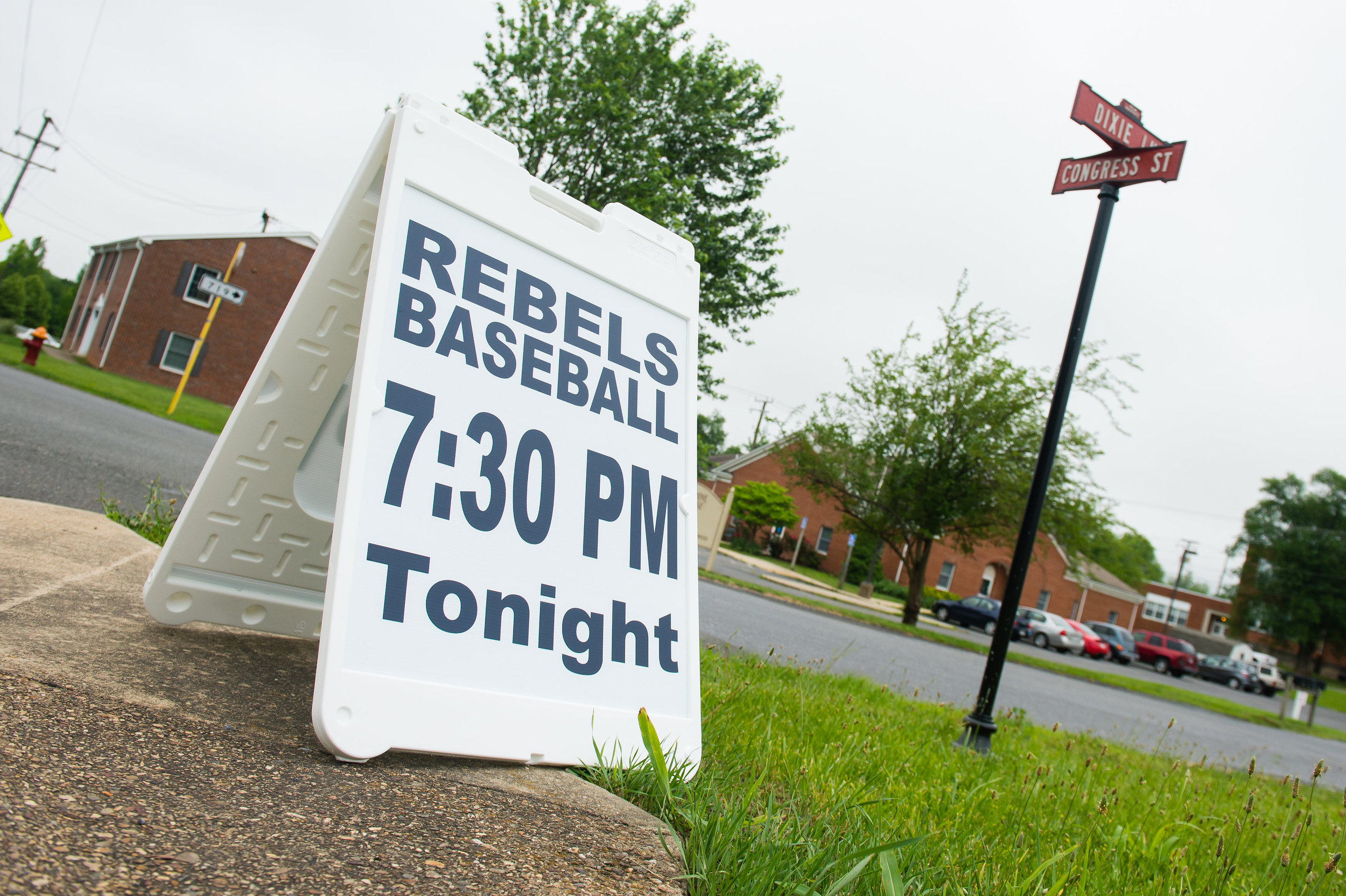
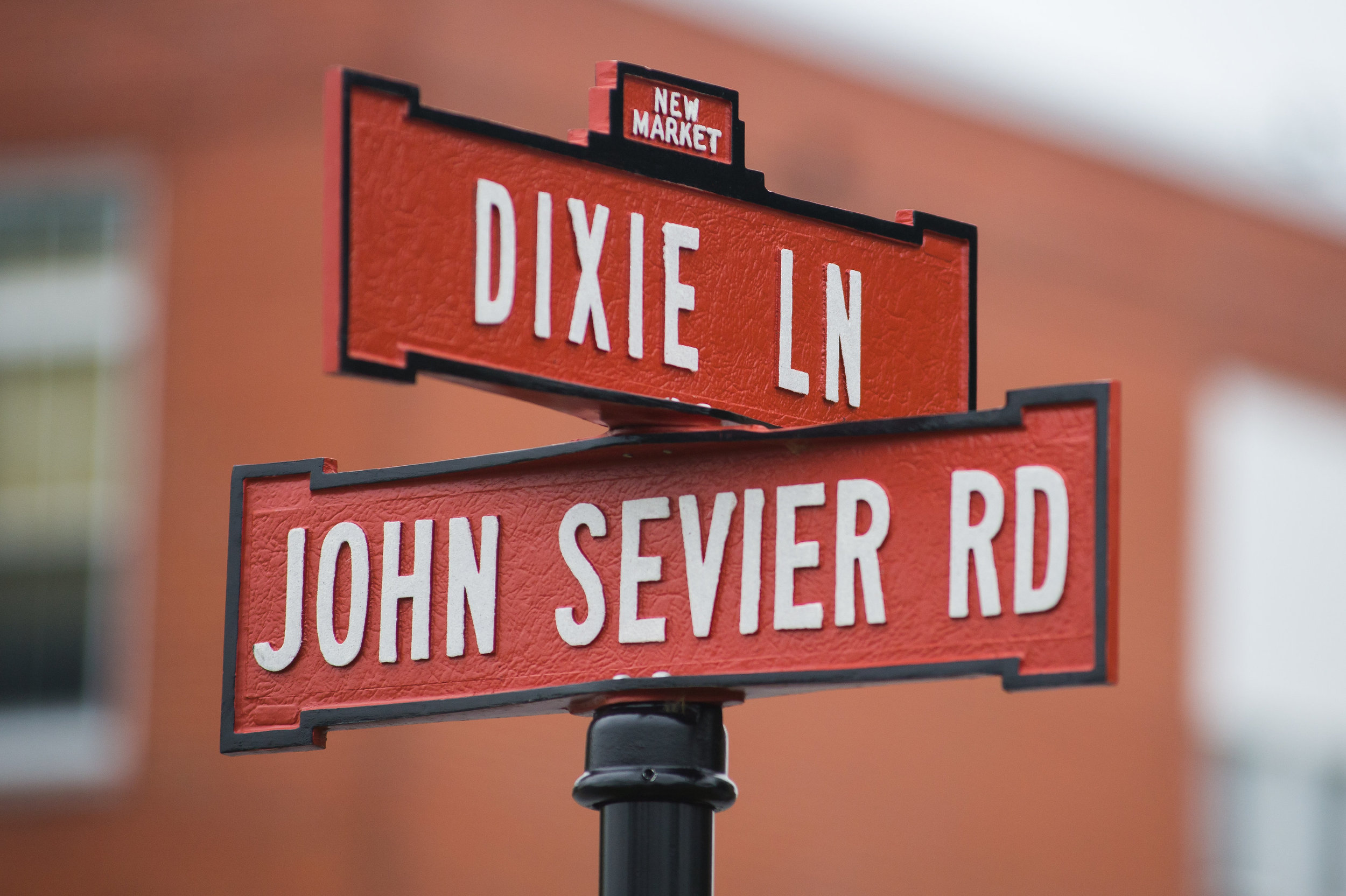
The small stoplight town of New Market is situated off exit 264, home to one of the most vital battles of Stonewall Jackson's Shenandoah Valley Campaign. The New Market Battlefield, the largest attraction in town, is lined with the split rail fences of the Civil War era and Congress Street slices the town in half. On the southern end is The Southern Kitchen, a meat-and-three where gravy is served with virtually every meal and the hardware store, a few blocks up, rarely pulls in their plants after closing.
Heading north past the lawyer’s office and antique shops and the bank called “Your Hometown Lender" a right turn puts you onto Dixie Avenue and leads into Rebel Park, home of the Valley Baseball League’s New Market Rebels since 1966. Deep fly balls here fade at the doorstep of Massanutten Mountain, the panoramic dividing line between Page and Shenandoah County. By anyone’s assessment, Rebel Park is not the most modern baseball facility in the league, but standing in the dugouts, there’s a consensus around here that it is certainly the prettiest. The fence running down the first and third base lines is an aging, forest green wood that fades with each passing summer. The outfield wall is a string of hand painted billboards for business sponsors like Valley Tobacco and Wease Automotive, whose owner, Bob Wease, is also coach and general manager of the rival Harrisonburg Turks down the road. Rivals or not, the teams of the Valley Baseball League support each other-except between the white lines.

"i'm still waiting on the suit."
"i'm still waiting on the suit."
**********************
Saturday, May 30th
9:15pm
Consumed by the game of baseball, Bruce Alger rarely goes a day without dealing with the business of baseball. A soft-spoken man, he tilts his head down and looks over his eyeglasses when speaking, to ensure his point gets across. At 64, he’s been involved with the New Market Rebels since he was 14 years old and for 32 of those 50 years, he’s been an owner, general manager, and any other job the day calls for. With financial support from the NCAA, all the teams in the Valley Baseball League operate as non-profits, so owners like Bruce routinely rake the fields and manage concession stands-there are no luxury suites here. Bruce is the face and the engine behind the New Market Rebels, and everyone in town knows it. He’s the one who takes calls from locals about weather cancellations and most afternoons throughout the year, you’ll see his truck with the “Rebel GM” license plate in the gravel lot a few feet from home plate. The backyard of his home sits along the right field line, often filled with foul balls and errant throws from across the infield. In left field or in the press box, Bruce is never more than a few steps from home. Bruce is to New Market what Ray Kinsella was to an Iowa cornfield. He is a man largely defined by his love for baseball, standing in his backyard, which yields nine innings of baseball for 20 nights a year.
In May of 2015, the night before the players were to arrive for the summer, Bruce did what he has always done. He sat in his backyard on his homemade bleachers with the 2015 Rebels coaching staff smoking cigars, drinking scotch, and telling baseball stories. Bruce has put the fate of this year’s Rebels in the hands of a driven young coach named George Schaefer, in his first season as a manager in the Valley Baseball League. Sipping scotch and puffing on a cigar, George is quickly realizing the responsibility that comes with running the town’s favorite team. He won’t be alone though, and he has brought in a young coaching staff, a group of former teammates just a few years removed from their playing days at Charleston Southern University. There’s pitching coach Stew Brase, a tall Midwesterner from Chicago who has just ended a stint in the minor league system of his hometown White Sox. Hitting coach Nick Chinners is a big and strong former power hitter who will spend the summer on the tractor doing field maintenance or throwing batting practice. He is most comfortable on a baseball diamond, and it’s clear from day one that it is where he feels at home. JJ Reilly, who will handle outfielders and the first base coaches' box, is a stocky firebrand who does not speak often, but when he does, it’s with passion. He is convinced his mouth will get him in trouble with the umpires this year. Like the players they have recruited to play this summer, George and his staff are anxious to start the next phase of their baseball lives as coaches. The opportunities in the Valley Baseball League are just as vital to young coaches as they are to the players they work with.
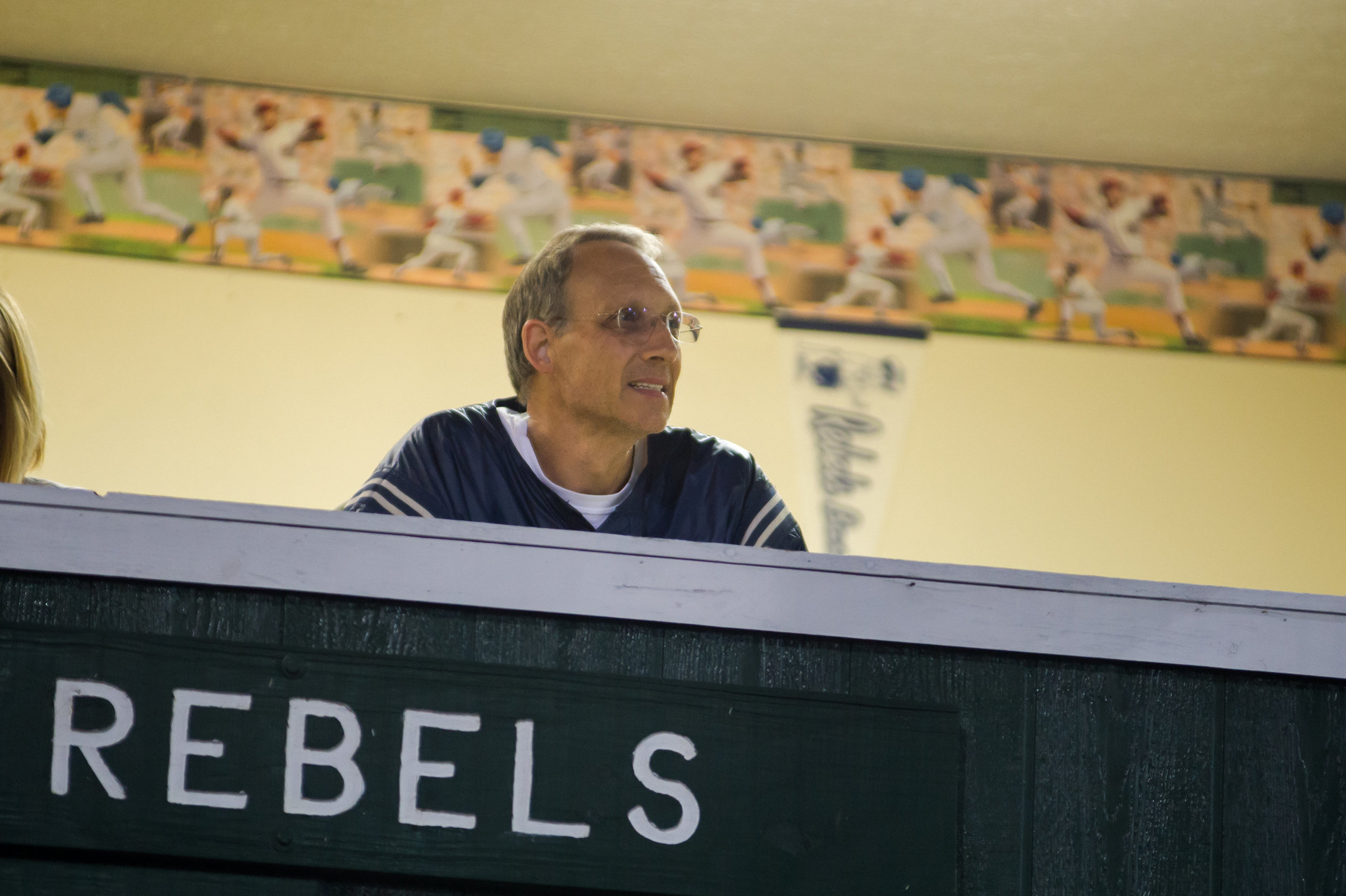
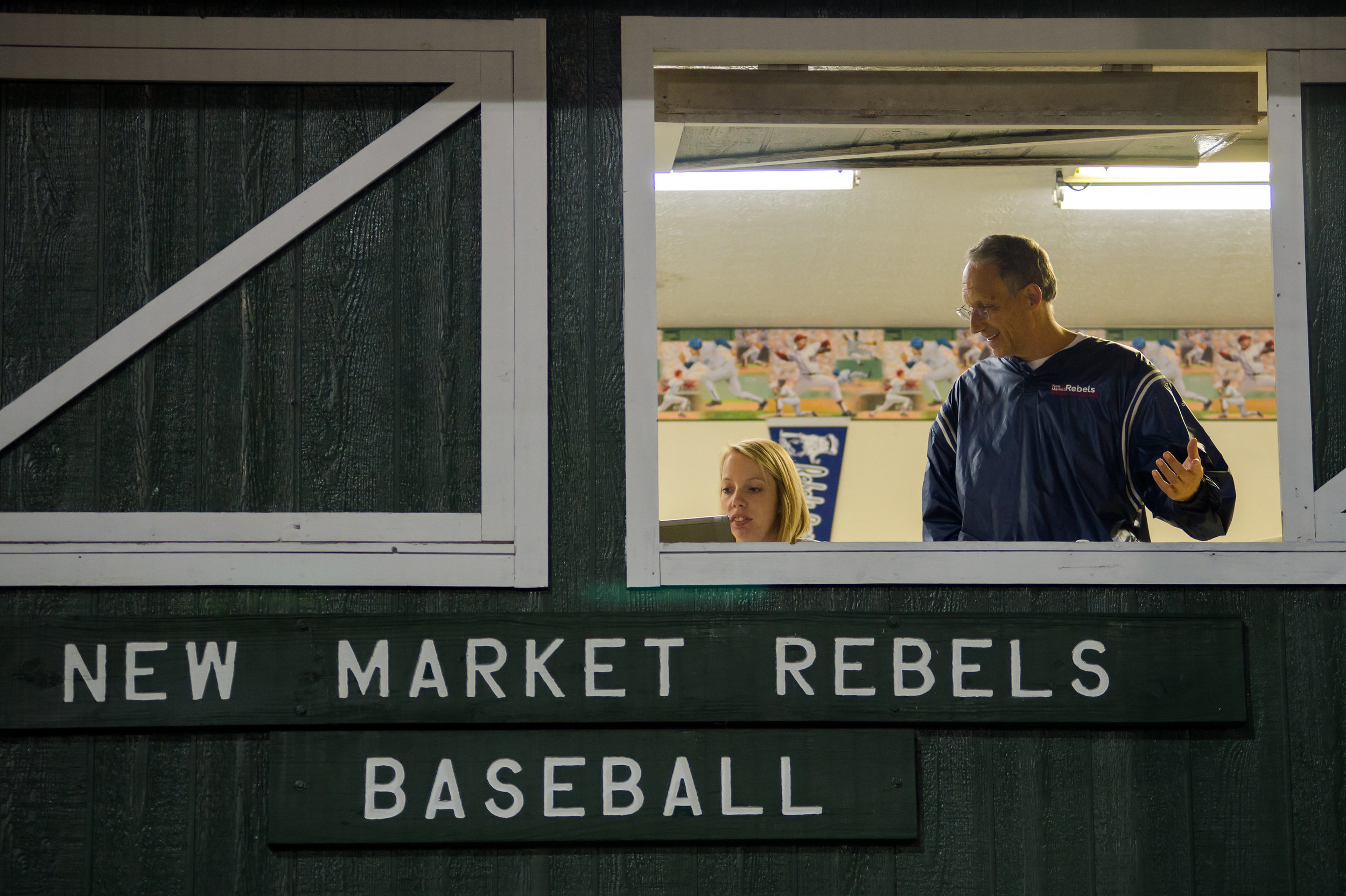
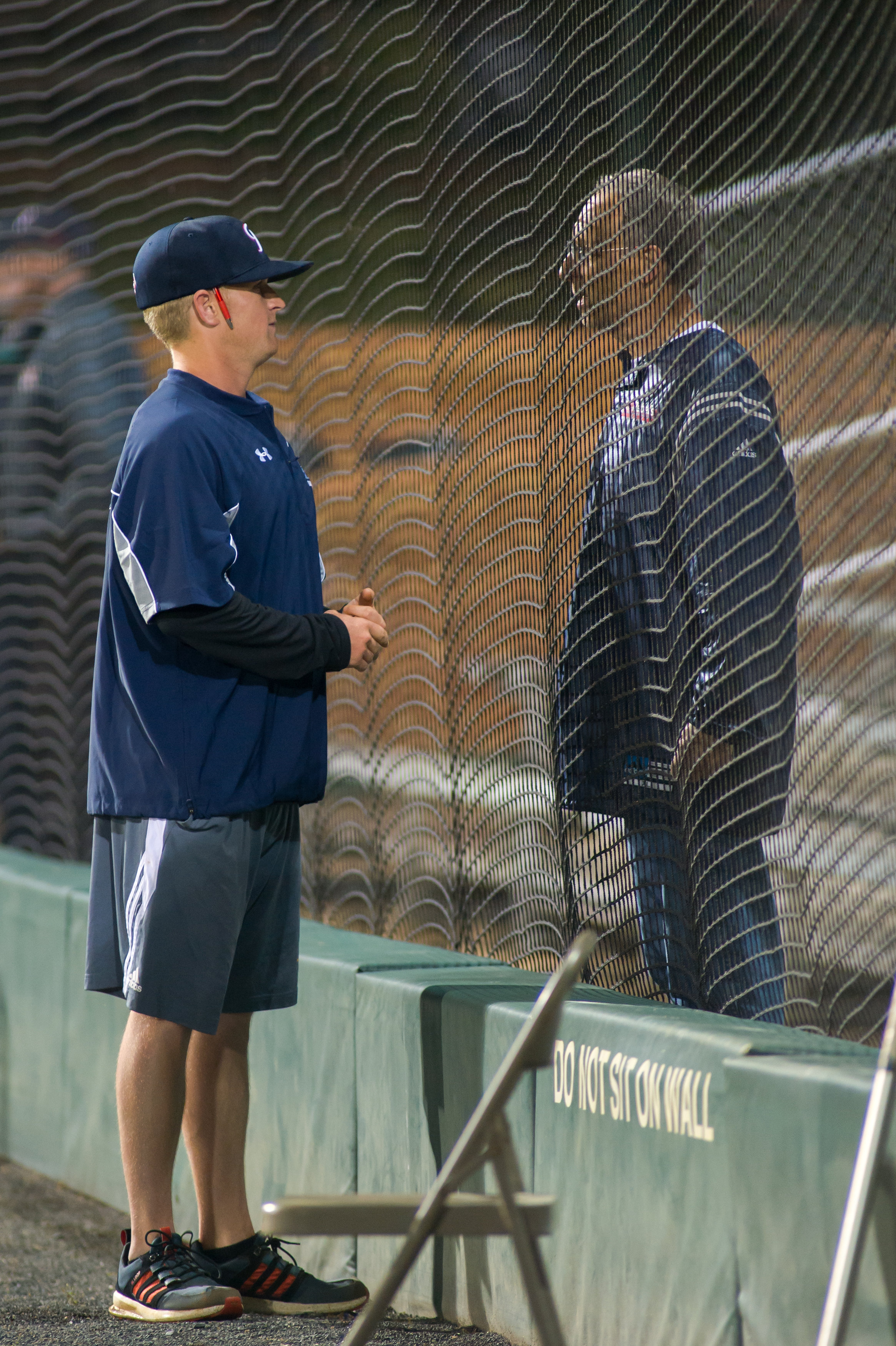
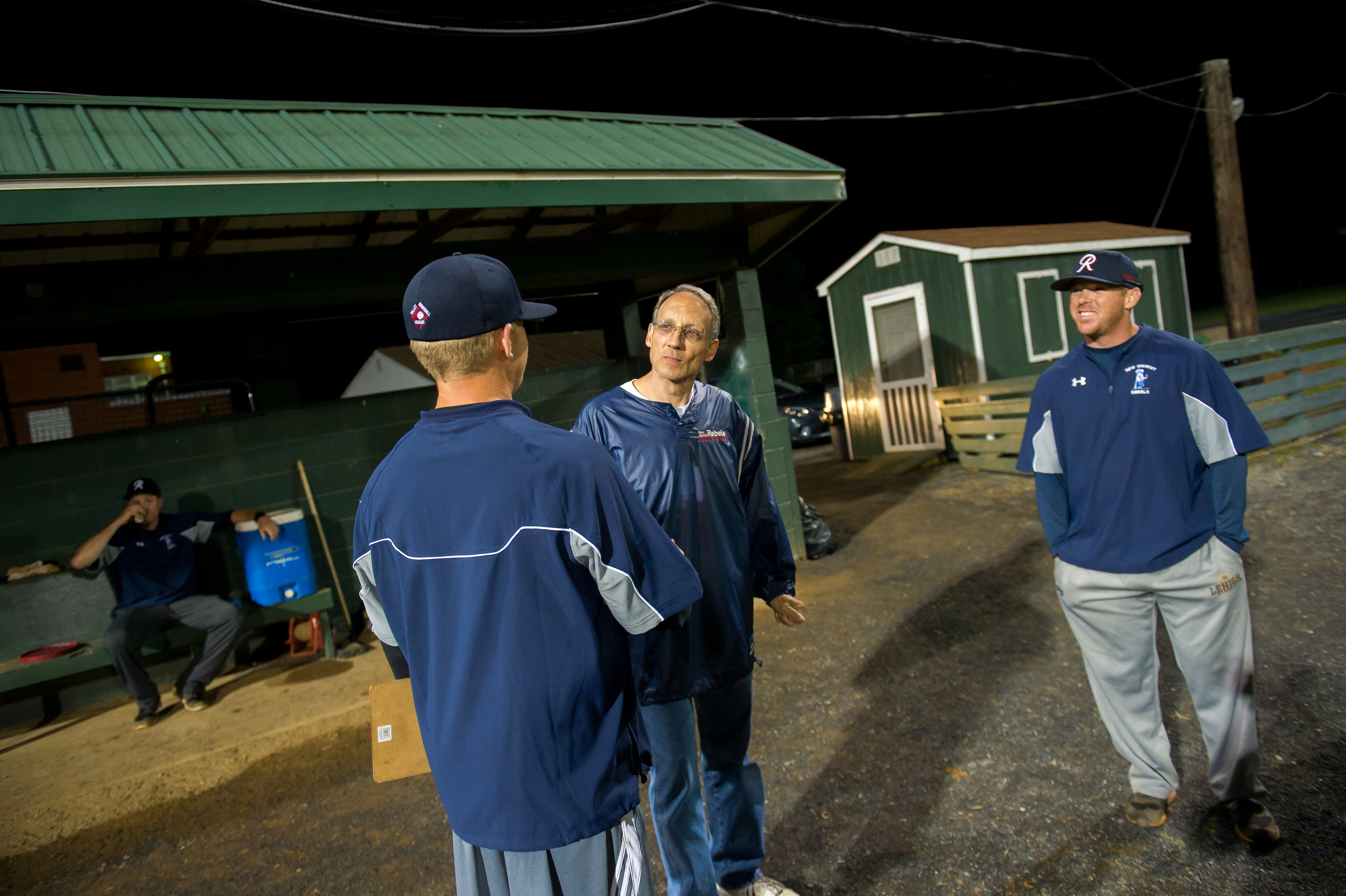
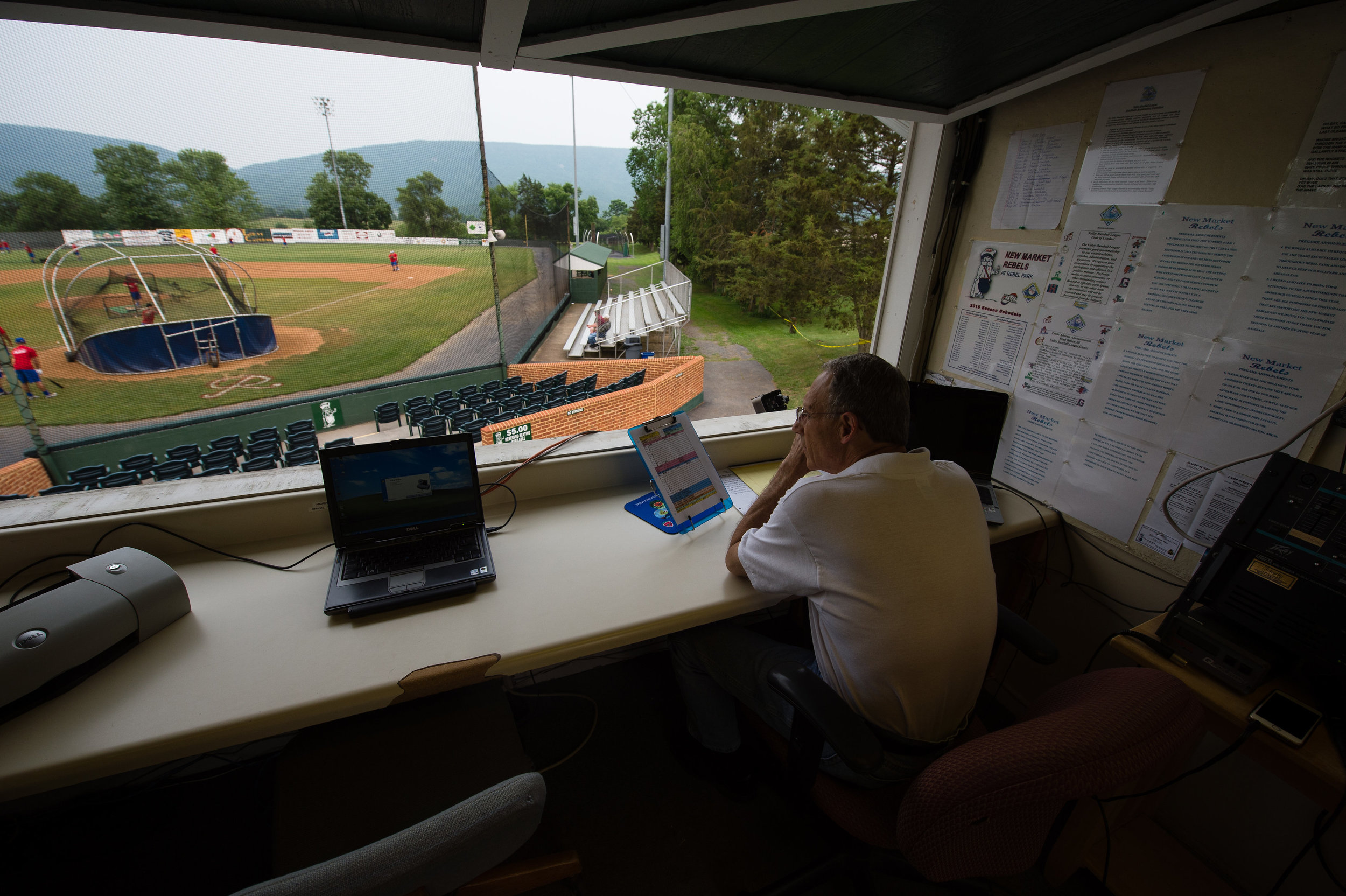
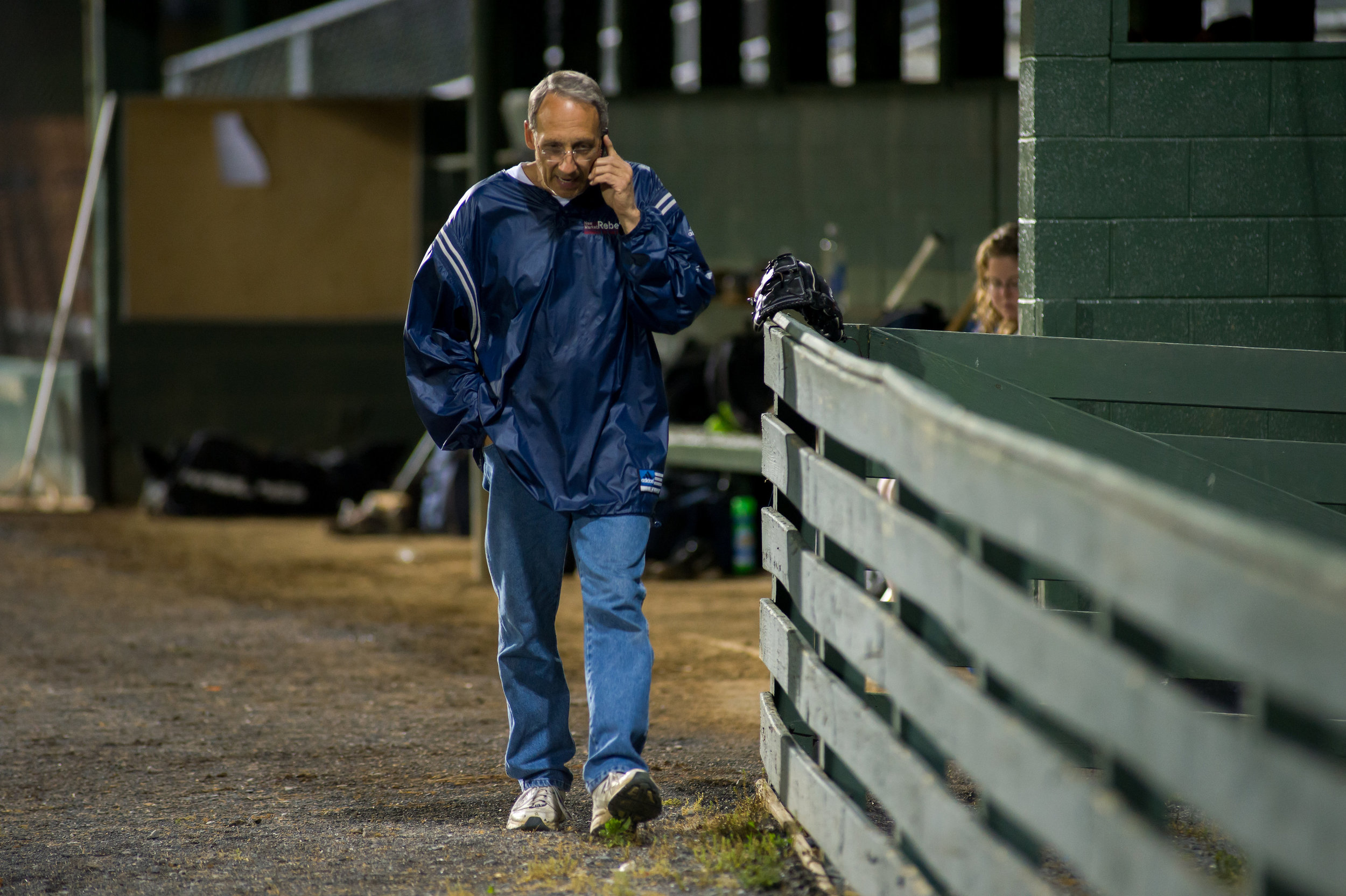
Through the cigar haze and glow of the lights on the field on the other side of the fence, Bruce and the staff did the only thing that they find comparable to playing baseball-talking baseball. They will talk about players, coaches, and the six degrees of separation that seemingly connect anyone who has played or coached college or summer league baseball in the last five years.
Looking out across the diamond, as the local recreational league wraps up their game for the night, Bruce started telling the young coaches about the players and coaches who have come before them. There was the pitcher from nearby James Madison University a few years back that promised to buy Bruce a three-piece suit when he made it to the major leagues.
“I’m still waiting on the suit,” Bruce said, drawing on his cigar.
There’s the guy everyone looks to as the example of what’s possible here in New Market, the outfielder named Brett Gardner, a Valley League All-Star in 2003. This summer, while the Rebels try and win another championship, Gardner will be roaming the outfield as the everyday centerfielder for the New York Yankees. It’s a safe bet all the players who come to play in New Market know Brett Gardner played on this field 11 years ago, just as nervous and just as anxious to get noticed.
There is the time Bruce broke the news to a player-who minutes before hit the game winning grand slam-that his father had passed away. It’s one of the few times Bruce would have rather the Rebels lost in order to soften the blow of the news. And there is the legendary story about Jon Kruk-yes, that Jon Kruk-getting tobacco spit on the carpets at his host family’s home, which just happened to be Bruce’s grandmother. Kruk mysteriously missed the next game due to injury after grandmother found out, and no one asked why. Sitting on Bruce’s bleachers, all four listened intently, nursing their scotch, smoking cigars, chomping at the bit to start the season. In about 18 hours, they would finally get to see, in person, the arms and bats they’d ordered from college programs across the country.
**********************
Sunday, May 31st
3:45pm
This afternoon the temperature was going from warm to hot leaving little doubt spring was over. While Nick sat on top of the ATV smoothing out the infield dirt, George was painting lines, and JJ and Stew took stock of equipment in the shed behind the concession stand. Upstairs in the press box, Bruce was wedged under the counter working on the internet connection that had gone down overnight. Seated at a table was Bruce’s assistant Katie, who was sorting through the necessary paperwork for each player ahead of their arrival. A perky blonde with a passion for baseball, Katie handles the work that Bruce can’t get to. Her title of team liaison is accurate considering her liaising is equal parts assistant GM, operations director and everything else. A native of the Shenandoah Valley, Katie has watched and loved this league as long as she can remember. During the summer, she finishes her days as a court reporter in Harrisonburg before driving 25 minutes north to New Market for home games. And when the Rebels are on the road, she is on the road too-Driving interns, team gear, and anything else that doesn’t make it on the team bus.
The stillness of the afternoon was broken by the sound of tires on gravel when Josh Burchell pulled in. When he steps out of his pickup truck, it is easy to see why Stew has such anticipation for his pitching staff, which has five players who stand 6’5 or taller. At 6’7, Josh Burchell is going to be an imposing figure on the mound, and he throws hard. Really hard.
A native of Killen, Alabama, population 988, Josh Burchell is going to feel right at home in New Market. He speaks with an innocent twang unique to rural Alabama, and when he isn’t playing baseball this summer, he’ll be working a part time job landscaping, his second favorite activity. A pre-med major in school, Josh has a disarming nature, a baby face and a grown man’s arm. He’s got a knack for comedic timing, aided by the aw-shucks draw in every syllable. Before the season is two weeks old, he is everyone’s favorite teammate. Like all the players, Josh has come to New Market with a shopping list of instructions from his college coaches on what to work on and where to get better. His goals this summer are simple: to work on his mechanics, and make better use of the lower half of his body to get more command and velocity on his pitches. For a pitcher Josh’s size, harnessing the power he has in his arm can make or break his chance at a spot in a scout’s notebook.
Players continued trickling in from all parts of the eastern seaboard and the deep south. They signed their paperwork, got their team issued workout gear, and began taking their seats on the bleachers behind home plate. Some players introduced themselves, others played catch by the dugout, but for all of them, there was anxiety. These were some of the best players on their college teams, and now found themselves worrying about a starting spot. There was Storm Edwards, the hard-hitting freshman from NC State, who would wow the coaches with his arm strength and explosive bat. Brian Lau is a tall and muscular prototype catcher from St Joe’s in Philadelphia. There are the Wright brothers, Lorenzo and Levi, outfielders from Belmont Abbey College in Belmont, NC, both fast with strong arms. By early evening, the 2015 edition of the New Market Rebels, representing baseball programs from Connecticut to Alabama and everywhere in between were here and were anxious. Sitting on the bleachers, they mostly looked at their phones, some had conversations, but all of them were uncertain. Aware of the stakes and settling in to a new town, it had the feeling of the first day of school. There were the players from large schools with big stadiums and bigger budgets sitting next to the scrappy upstarts from rural South Carolina. In the baseball universe, as it is in most sports, there’s two leagues: The haves and the have-nots. But the Valley Baseball League doesn’t discriminate based on how big your college program is. How expensive your team uniforms are has no bearing on whether you get to be the starter or not. If you hit the ball hard and throw with conviction, you will play.
While the team volunteers, host families, administration and staff introduced themselves, Bruce stood off to the side, preparing his introductory message to the team. When it was time for him to speak, he delivered his expectations in a simple message. A message they already knew, but one they wouldn’t ignore.
“There’s thousands of players across the country that would like to be sitting where you are,” Bruce said, looking over his eyeglasses, a Shenandoah Valley sunset beginning in front of him.
“You guys will have the summer of your life,” he said, accentuating the point with his index finger.
The second part of his monologue drove into the heart of each of them, and why they were here.
"Don’t take a play off,” he said. "If you show anything lacking desire, you will come off that scouts’ list. They’re here, and they’re watching every single play. This is all about you. I don’t get paid. Watching you chase your dream,” he paused for a second. “That’s my pay.”
Walking across the parking lot to the Rotary Pavilion, George, his coaches and his players were about to have their first team-only meeting. Standing in front of the roster he had built, George looked them in the eye, and one by one, explained his expectations. He explained the responsibility that comes with playing in New Market. He explained that the local police know who you are, and the townspeople have opened their homes. Losing the trust of any of those would likely earn you a quick exit from town. But most importantly, he reminded them, this summer represented an opportunity. A quiet anxiety on their faces, the players quickly understood that George Schaefer, just a few years removed from the exact spot where they were sitting, was in charge.
George Schaefer has never been short on ambition. He grew up in Norfolk, VA, the son of an attorney and local news reporter turned state politician. His college career began at Catholic University in Washington, DC before he transferred to Division I Charleston Southern to pitching in front of larger crowds and more scouts. After an arm injury in summer ball and the realization that the next level may not be in the cards, he turned to the next best thing: coaching. His first year in the Valley Baseball League, he managed the Geneva Red Wings of the New York Collegiate Baseball League to a 30-16 record. But George Schaefer is not, on the surface, a typical baseball coach. A summa cum laude graduate at CSU, he earned a graduate degree from Lehigh University in politics and policy, quotes former Defense Secretary Robert McNamara, and watches The West Wing once a year for inspiration. For a brief period, he worked as a political speechwriter in Norfolk, and without asking, figuring out which side of the political aisle he sits might be a futile effort. He speaks in a measured, deliberate and confident tone, and isn’t lacking in goals or the work it takes to get them. For Nick, their friendship was obvious the day they met at Charleston Southern, despite their contrasting backgrounds and interests.
“When you shake his hand, its chest out, strong grip, I’m George Schaefer,” Nick says of the first time they met. “It was announcing his presence. Since that first handshake, me and him, we hit it off. And we couldn’t be more opposite.”
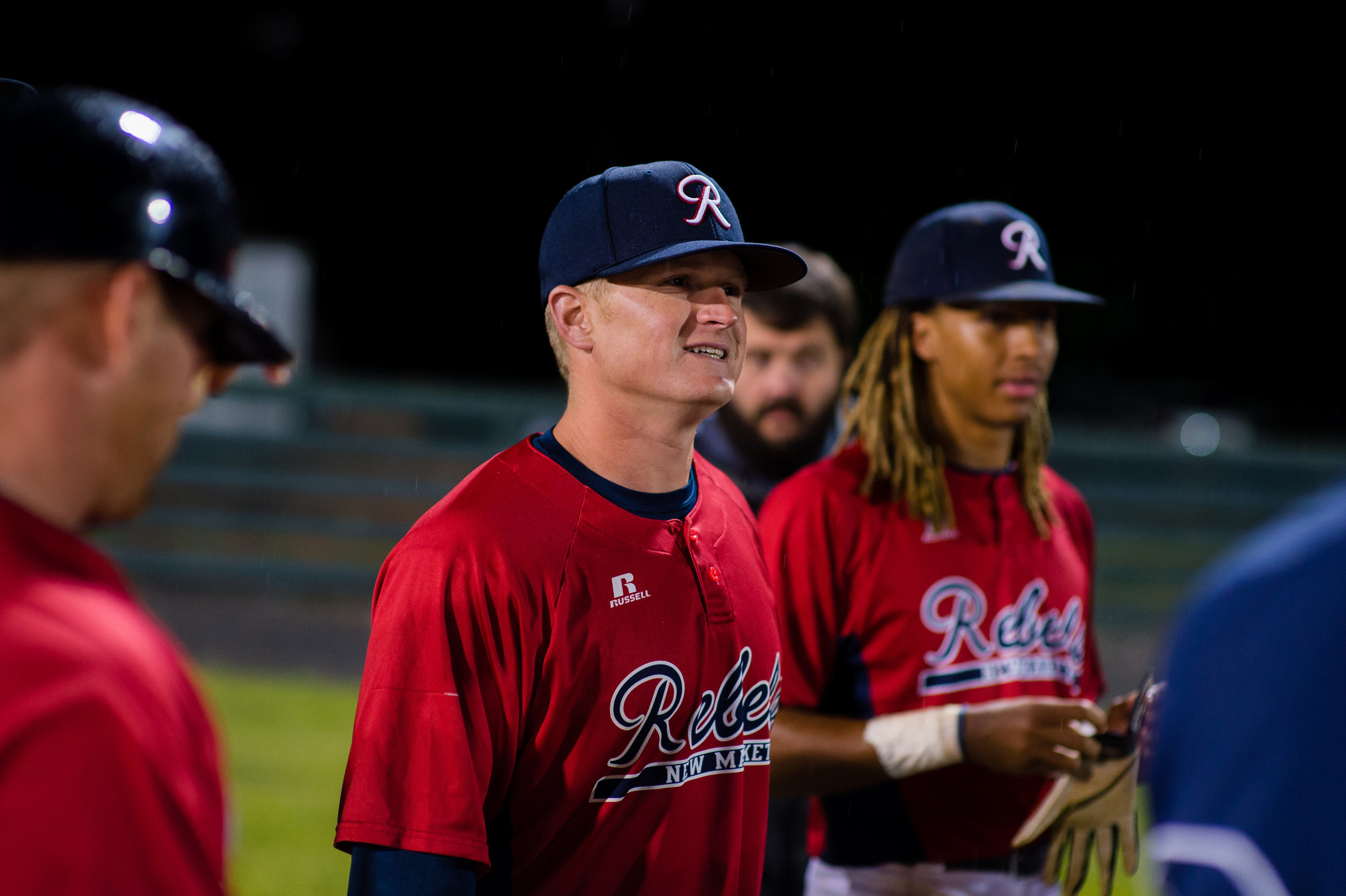
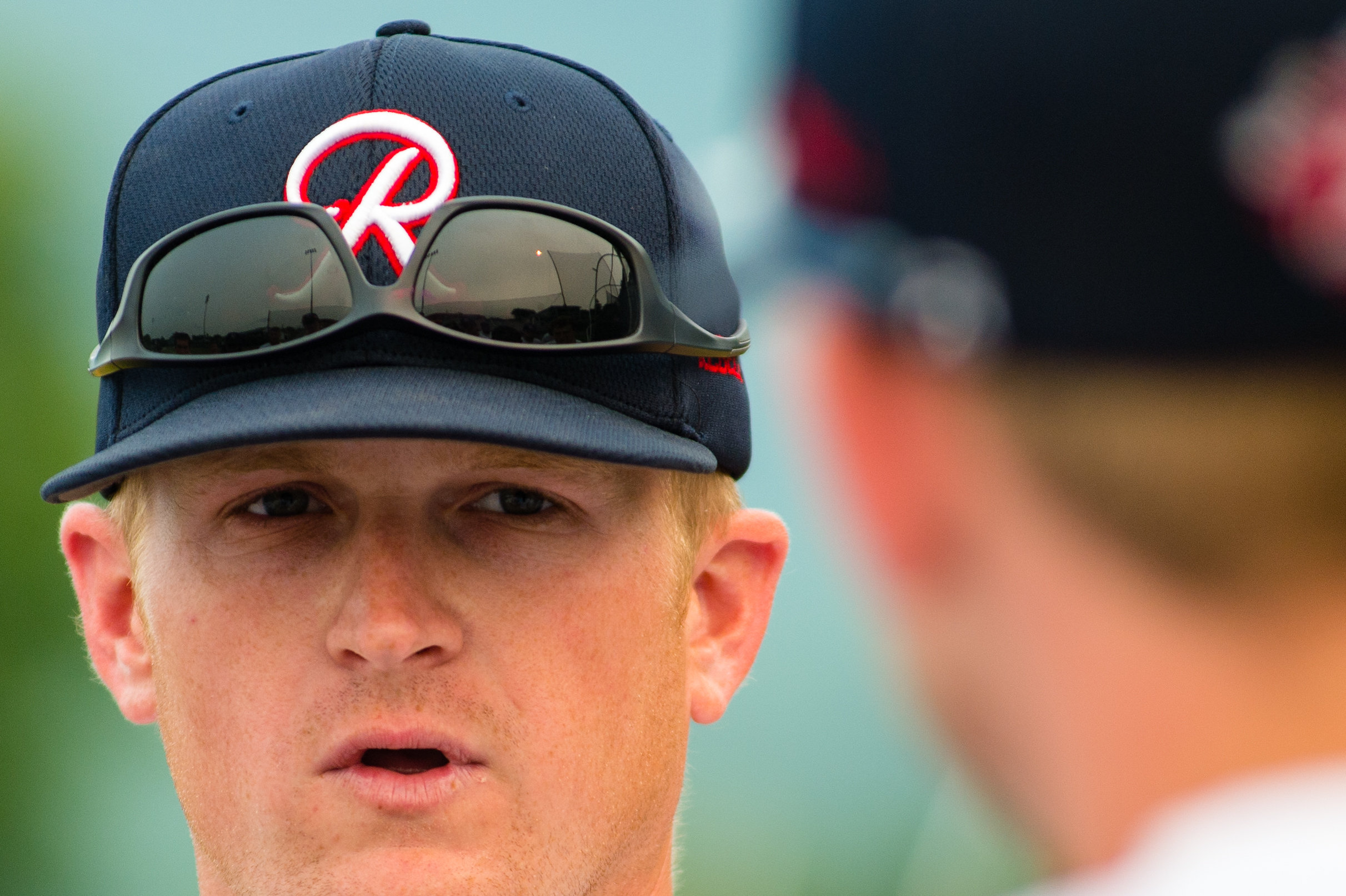
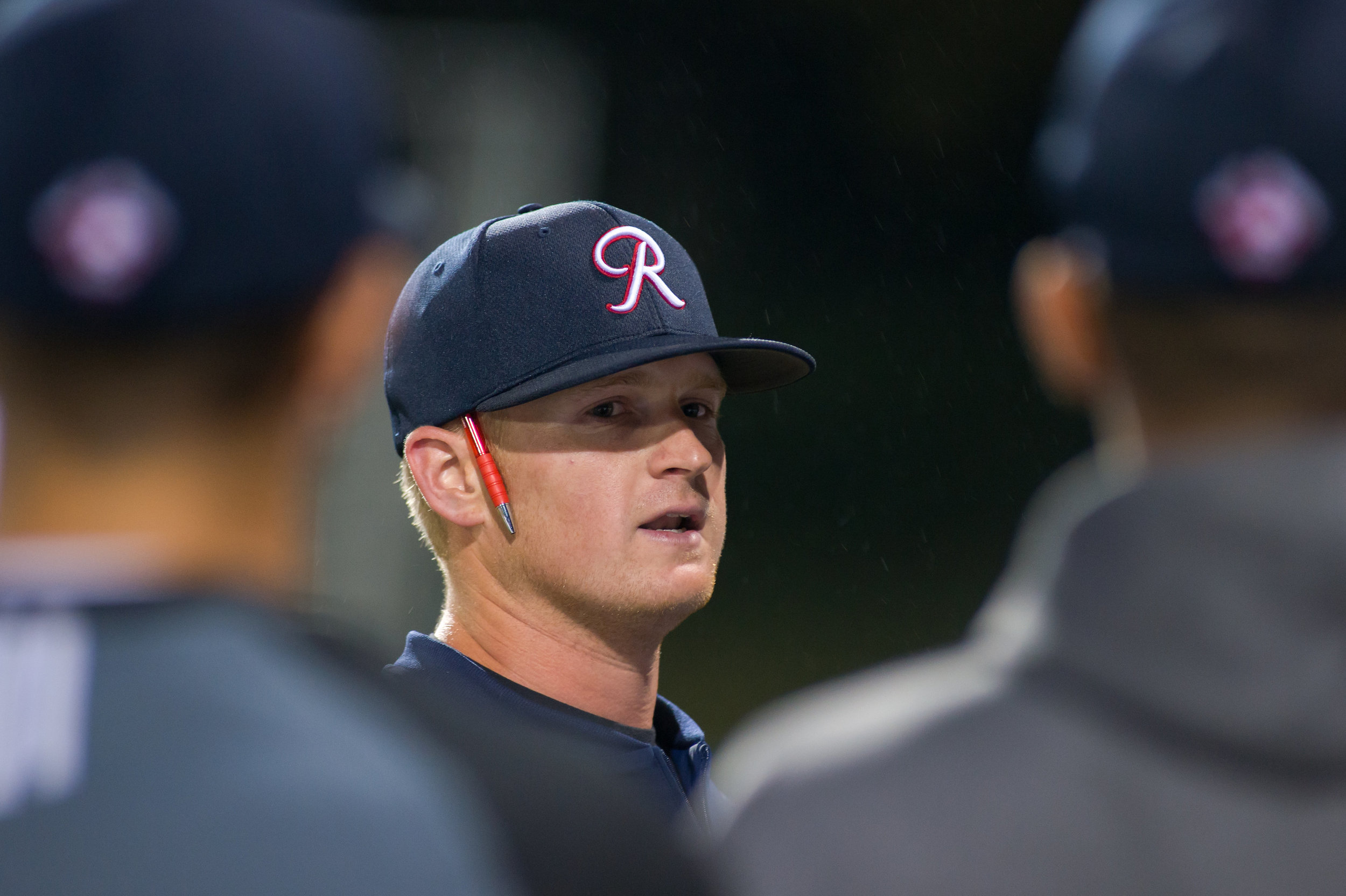
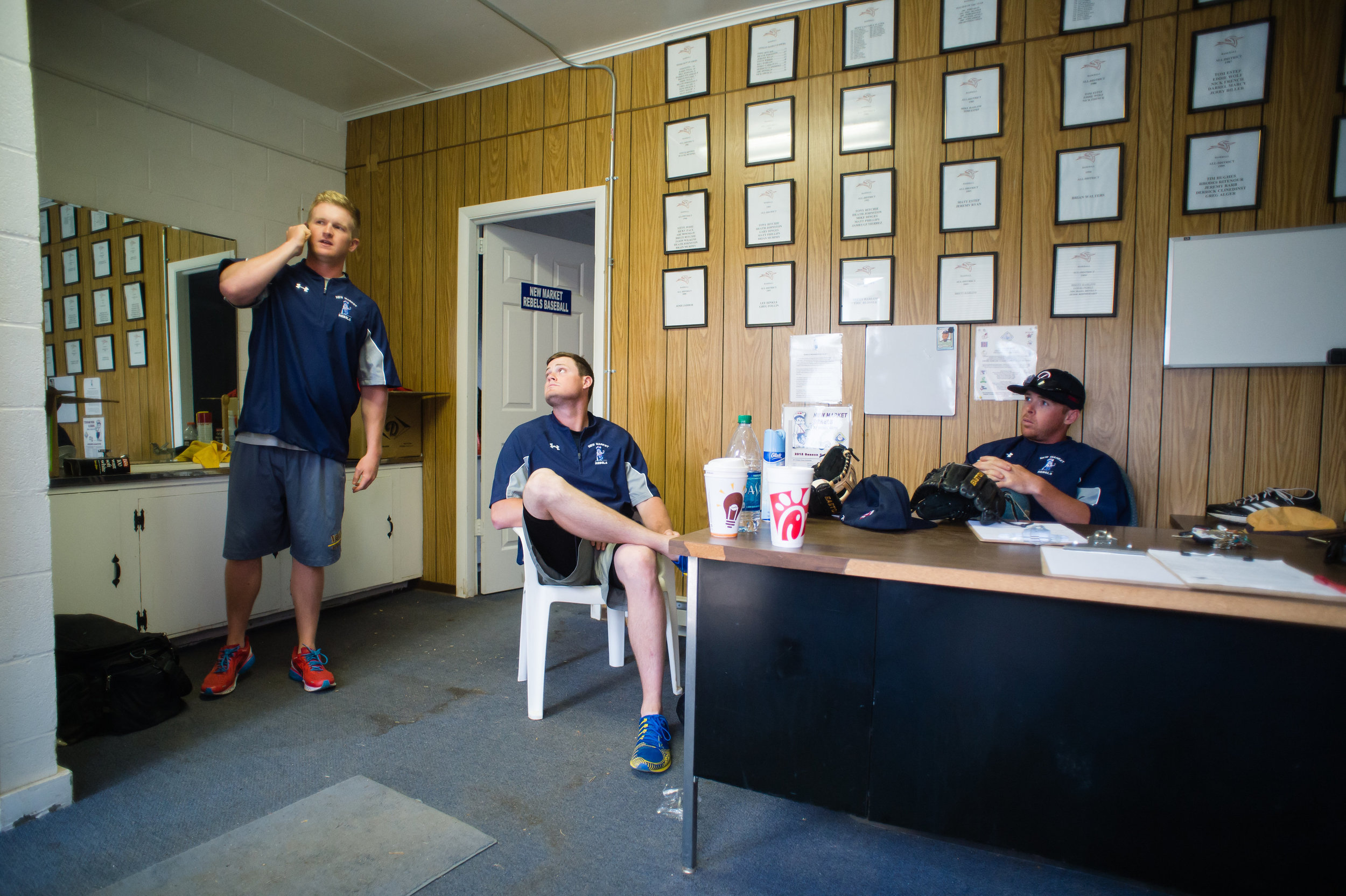
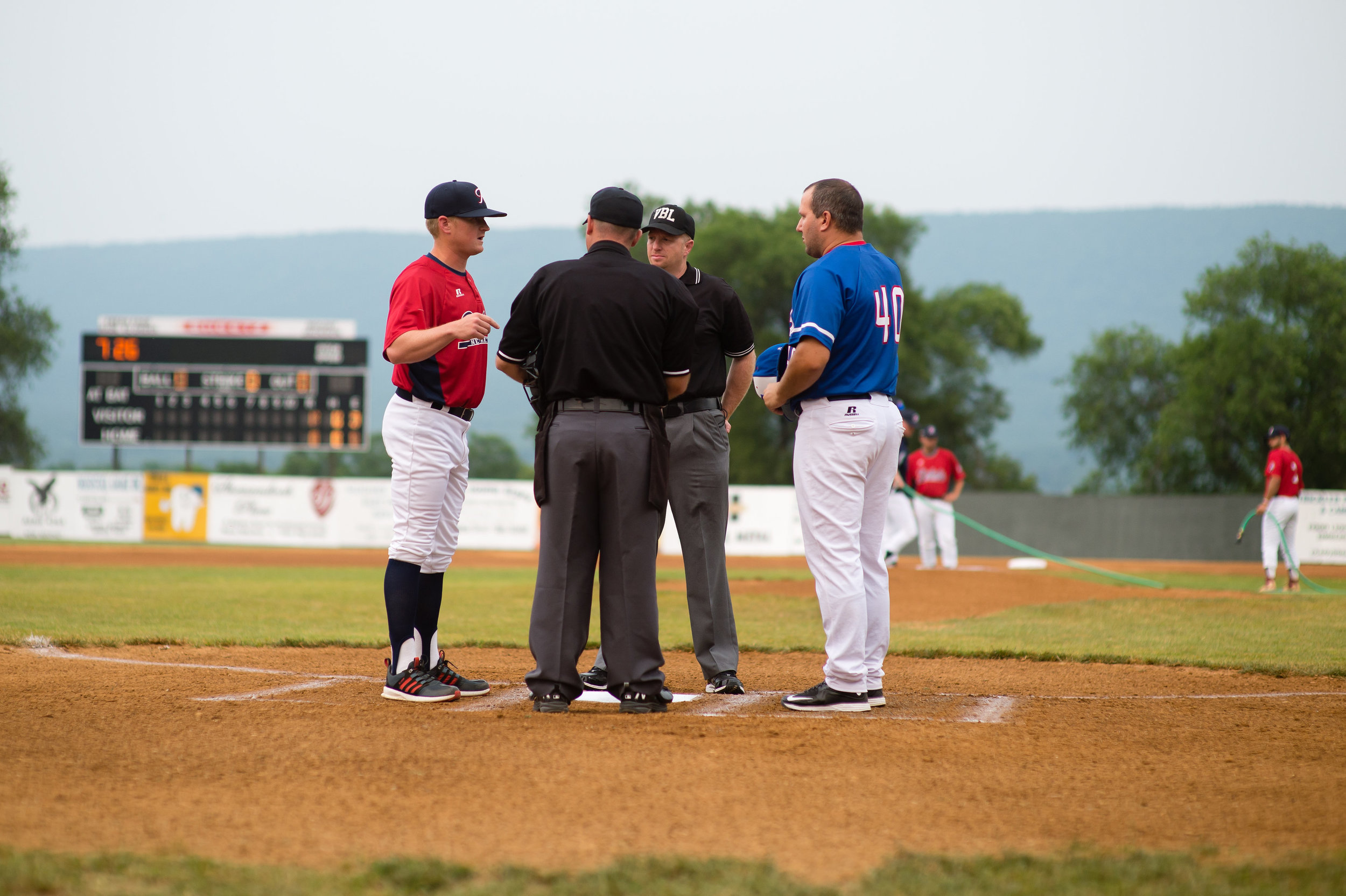
Despite his academic background and worldview beyond the baseball diamond, he is still, at his core, a ballplayer. He has a natural way of relating to the players, a benefit in the dugout and in the clubhouse. In addition to his summer with the Rebels, George has just taken on the full time position of recruiting coordinator for Iona University’s baseball program, where he is an assistant coach. This summer he will be routinely making long treks to the corners of Virginia to find baseball players for Iona, but he’ll never take his eye off the big prize: making the decisions everyday for the New Market Rebels.
**********************
Monday, June 1st
8:20am
Lined with wood panel walls and regional awards from high school championships of years gone by, the coach’s office at Rebel Park sits firmly in the past. It is one square room with a smaller room connected on the back, and during the summer months, voices are tough to hear over the fans that run to keep the air moving. Early this summer, Nick, Stew, George and JJ have gravitated to their own corners of the room, where they’ll sit almost every morning during the season. Sitting behind the only desk in the office, George is cleaning his shoes, due in part to his meticulous nature, and partly to break the nervous energy of the first day of practice. As he glances at the roster on the desk, his nerves say he i s ready to take the wrapper off this team.
“It’s about time,” he said, leaning back behind the desk, his shoes in his lap.
“I’ve been working on this roster since October, and the blind date is officially over,” he says to no one in particular. The door of the office is wide open, and players have begun arriving for practice with bags from McDonalds and Burger King, New Market’s two quickest culinary options.
Across the driveway, Nick, JJ and Stew are sorting through uniforms. The Rebels, as they have forever, play in a navy blue and dark red color combination. This year, the home red jerseys have Rebels splashed across the front with white pants and navy blue stirrup socks, a throwback to the 80’s and 90’s baseball fashion that’s making a comeback. You would be hard pressed to find another sport whose players are as superstitious about uniform appearance, and while the players get their jerseys, Nick gets a call from his mom, back in South Carolina. Nick has gotten a jury summons for later in the summer, back at home and while he’s hoping his mom can make some calls and he can get an exemption, it appears the civic duties of South Carolina don’t care.
Standing in the dugout, Bruce Alger lives for these days. There have been roughly 270 days that have passed since someone in a Rebels uniform threw a baseball, and it wouldn’t be a stretch to think Bruce counts each one of them. At 9:37am on June 1st, the planning and logistics of running a summer league baseball team finally gave way to bats on balls. Under the crackly speakers playing Kenny Chesney and in front of Massanutten Mountain, the players broke off into position groups and Nick Chinners threw the first pitch of batting practice. Bruce Alger could exhale.
There is a distinctly percussive rhythm to a baseball practice. There is a distant pop of the pitchers throwing in the bullpen and the gloves all over the infield. Maybe it’s a testament to the bat speed these hitters possess, but the bats don’t crack. They smack the ball. When you put all the sounds together, they form a certain symphony men like Bruce Alger can’t get enough of. For the first hour of practice, George isn’t doing a lot of talking. Instead, there is a lot of watching, with a periodic “atta boy” to a long fly ball or a hard hit line drive. He’s quiet, but in his head, there’s a million scenarios playing out about who hits for power, who hits for contact, and the speed that might be carving up the base paths the next few months. At third base is Thatcher Coleman, a gritty infielder and catcher from the University of South Carolina, fielding ground balls and adjusting to the dirt and the hop of the balls hitting the grass. After booting a hard line drive down the foul line, he laughs, looks towards the dugout and lets it roll off his back.
“I’ll figure it out,” he says, grinning. First day. New field.
Roberto Rivera, a lean infielder from St. Augustine’s University is at shortstop, flashing the fluency with which he navigates the infield dirt. He has got great footwork and the way he gets to ground balls and comes up throwing is one single continuous motion with no interruptions. Every throw is accentuated by the dreadlocks that come out from under his hat and if he is adjusting to the new field, it’s hard to notice.
“Dude, I don’t know what I’m doin’ over here,” he says grinning towards third base. “I’m making it up as I go.”
George, leaning against the rail of the batting cage, has noticed the way Roberto moves around the infield. He’s also noticed some of the bats and where they’re putting the baseballs.
At 6’1, and 230 pounds, Garrison Elliot leaves no doubt to the untrained eye that he is built for power. When he swings the bat, every ounce of his body moves with him, uncorking a ferocious and violent swing. This morning his quick swing is exacting its revenge on a number of the pitches he is getting from Nick at batting practice, putting them over the right field wall with regularity. As a preferred walk-on at Auburn, he spent the spring working out and practicing with the Auburn baseball team, but hadn’t yet gotten a spot on the roster. His job this summer is simple: play well and play often, and show the coaches at Auburn he deserves that roster spot. If his swing and power is not good enough for Auburn, it is a testament to the baseball talent at the Division I level. When Garrison hits the ball square, it goes far. He effortlessly strokes a home run over the right field wall, and on cue, the players gathered around the cage raise their arms in celebration. There's some power in this lineup. Garrison certainly has pop, but it’s important to be cautiously optimistic during batting practice. Any ballplayer will tell you that batting practice and pitching in a live game are two very different things. Still, it is difficult for George and the coaching staff not to wonder what Garrison’s potential could be this summer.
Following practice, George has his squad huddled just off the third base line. He wants to gives players a talk before they break for the day, before returning tonight for an evening practice.
“Listen up guys,” he says with his measured tone, pausing to stress the point.
He knows that as the players leave the park, before coming back for the evening practice, they’ll be thinking about who threw hard and who hit even harder.
“Be the guy everyone’s talking about when we go home today.”
George’s post practice talks with the team have to maintain a balancing act, straddling a clear and direct message of team unity, but stressing the importance of competing with each other.
Playing in a small town like New Market, where there are few distractions, has fused these ballplayers together. The nervous energy of 24 hours ago is long gone, replaced with the joking and ribbing that only young men in their early 20’s are capable of. The comfort of the baseball diamond, and playing a game they all love has brought down any barriers that existed when they met for the first time. Leaving the parking lot in small groups, they seem to understand they will not get very far if they don't do it together.
Sitting in the dugout after practice, George and the staff are energized by what they’ve seen. They talk about position possibilities, and the deeper baseball discussions about things like bat speed and glove position. As the players dispersed, some to get lunch and some to their landscaping jobs, a group of pitchers walked out behind the outfield wall to retrieve the balls that Garrison had hit out during batting practice. Those things cost money.
*********************
Wednesday, June 3rd
5:15pm
The New Market Shockers are a roster of local men who play baseball not for the pursuit of a professional career, but because they love the game. Part of the local Rockingham County Baseball League, they are mostly former local high school and college baseball players who once had the hope of being seen by a scout, but now with day jobs, know those hopes are going unanswered.
Tonight they will be the first gauge in an exhibition game for George, Stew, Nick and JJ of the talent that’s sitting in their dugout. Before baseball though, Bruce will introduce the Rebels to the 60 or so community members that have come to the ballpark tonight for a pregame picnic just off the left field line. One by one, the coaches, players and team staff go around introducing themselves to the community, local folks who have been itching to return for Rebel baseball this summer. Standing at the far end of the pavilion, the Rebels bat boy, a little boy named Zack, steps up to introduce himself, but can’t hide his embarrassment in front of the pavilion.
“I’m Zack, and I’m a…..” He freezes.
Justin Robarge, a 6’5 right-hander majoring in chemical engineering from University of Hartford, saves the day. He gives Zack a push, encouraging him to speak up.
“A bat boy,” he says, prompting him.
Zack remembers, and as he will a hundred more times this summer, his face brightens up at the thought that he is part of the New Market Rebels.
The picnic tables are lined with barbecue, home cooked dishes, and a spread of desserts that have Josh Burchell, the big right-hander from Alabama A&M drooling. Standing at the buffet line, he has eaten more than just about anyone, and is not bothered that he’ll be taking the mound in 90 minutes. After two rounds of dinner, he fills up a final plate of desserts, stashes it in his truck, and heads to the bullpen to start warming up.
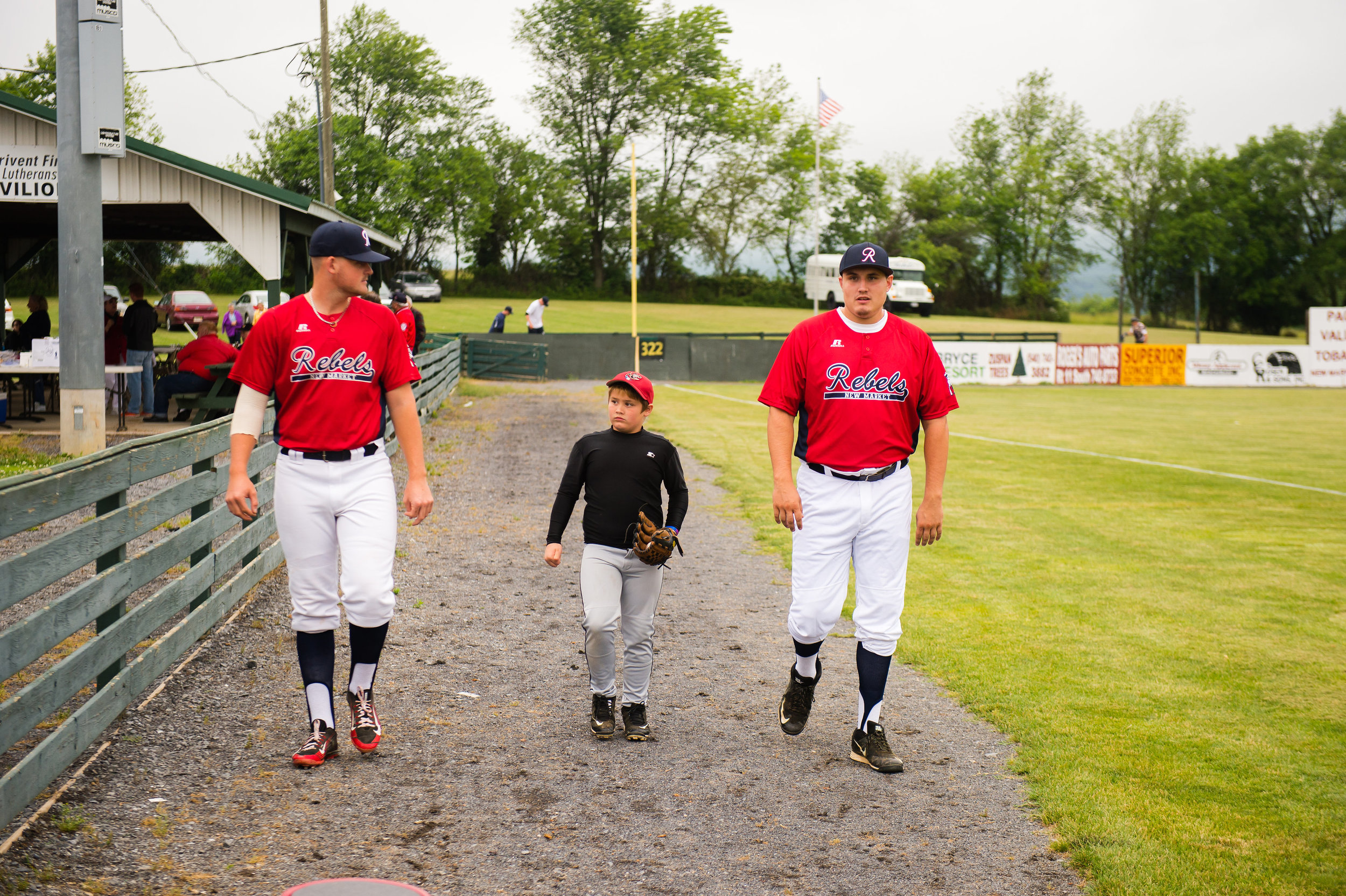
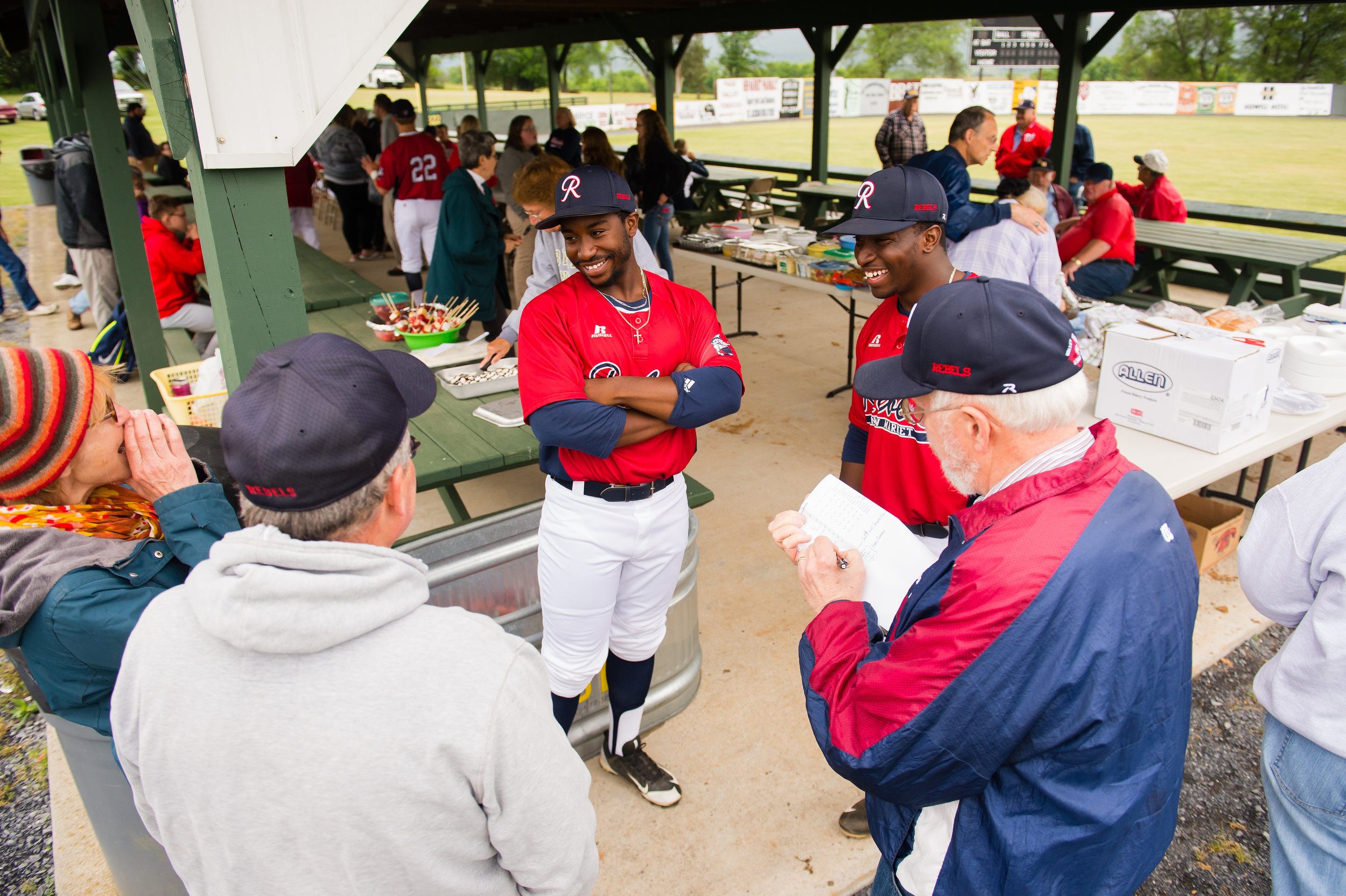
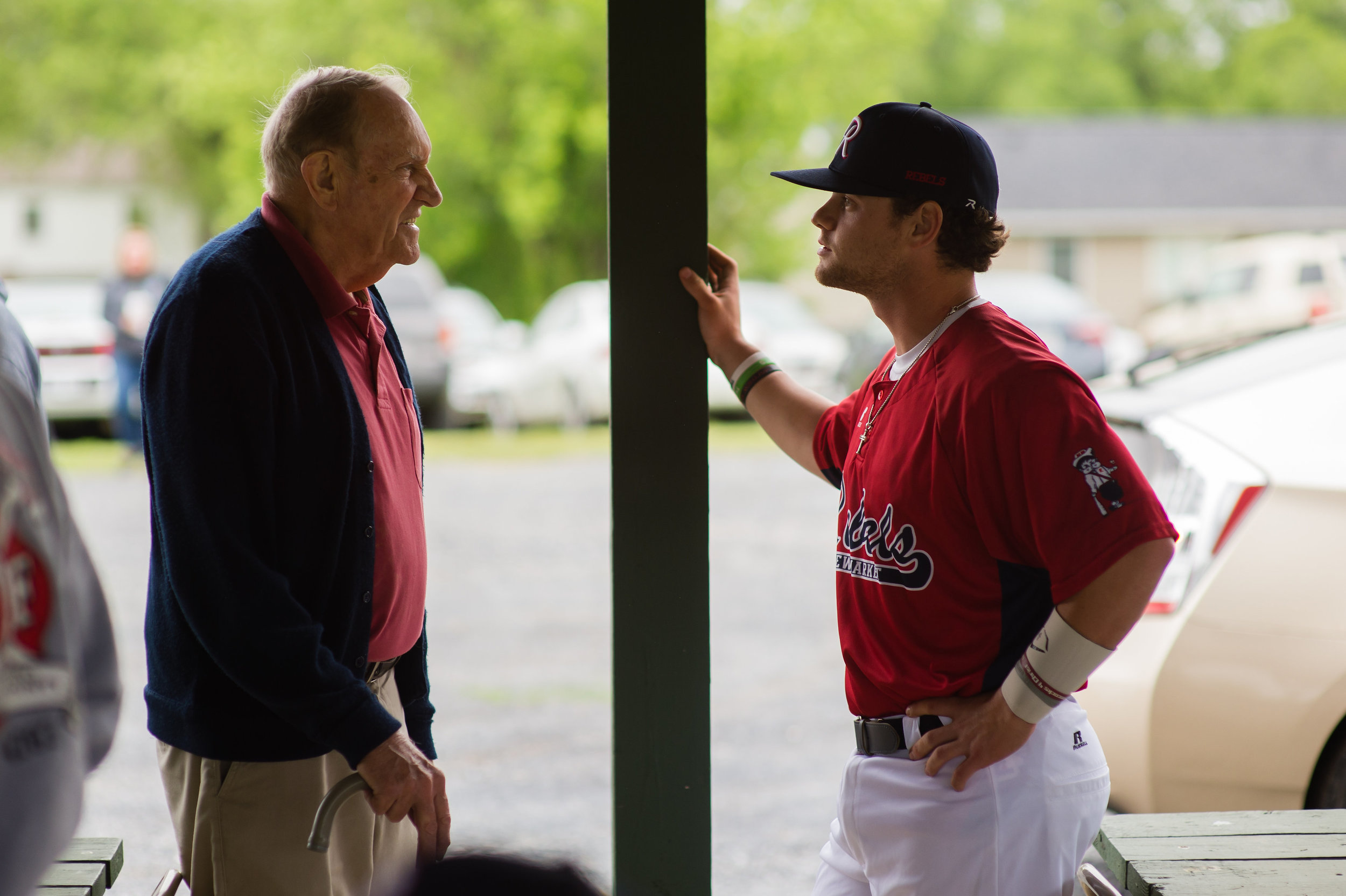
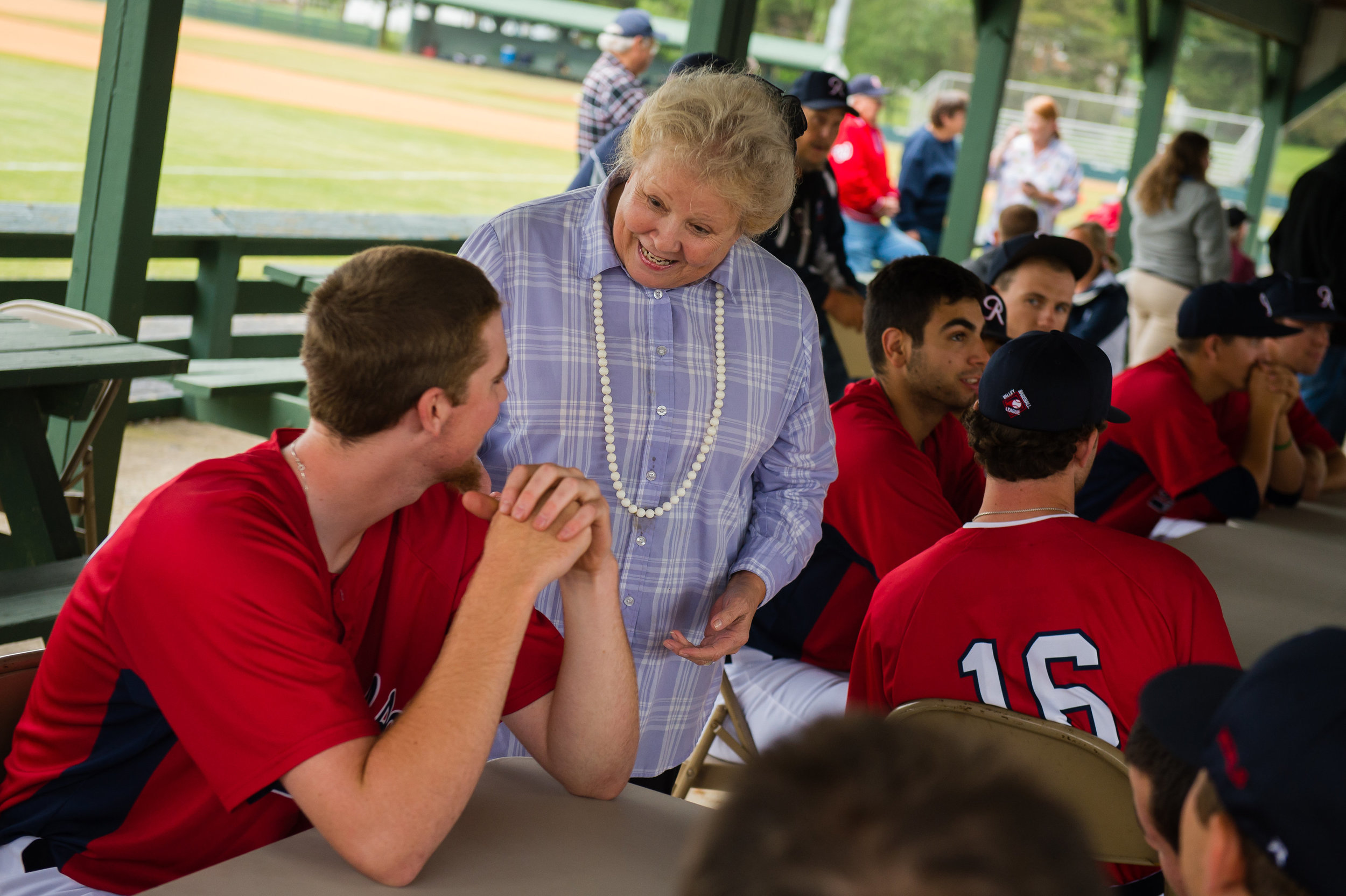
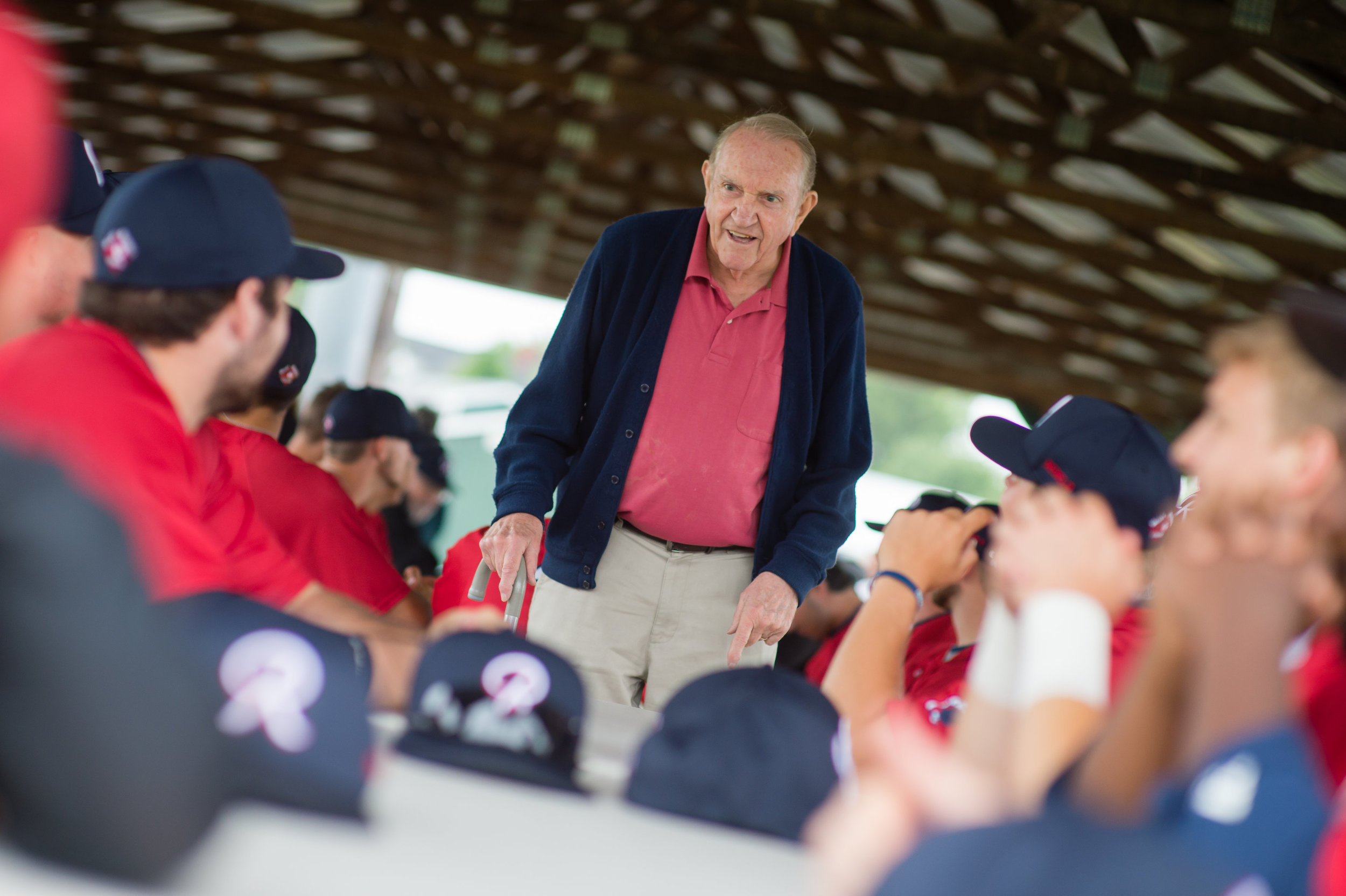
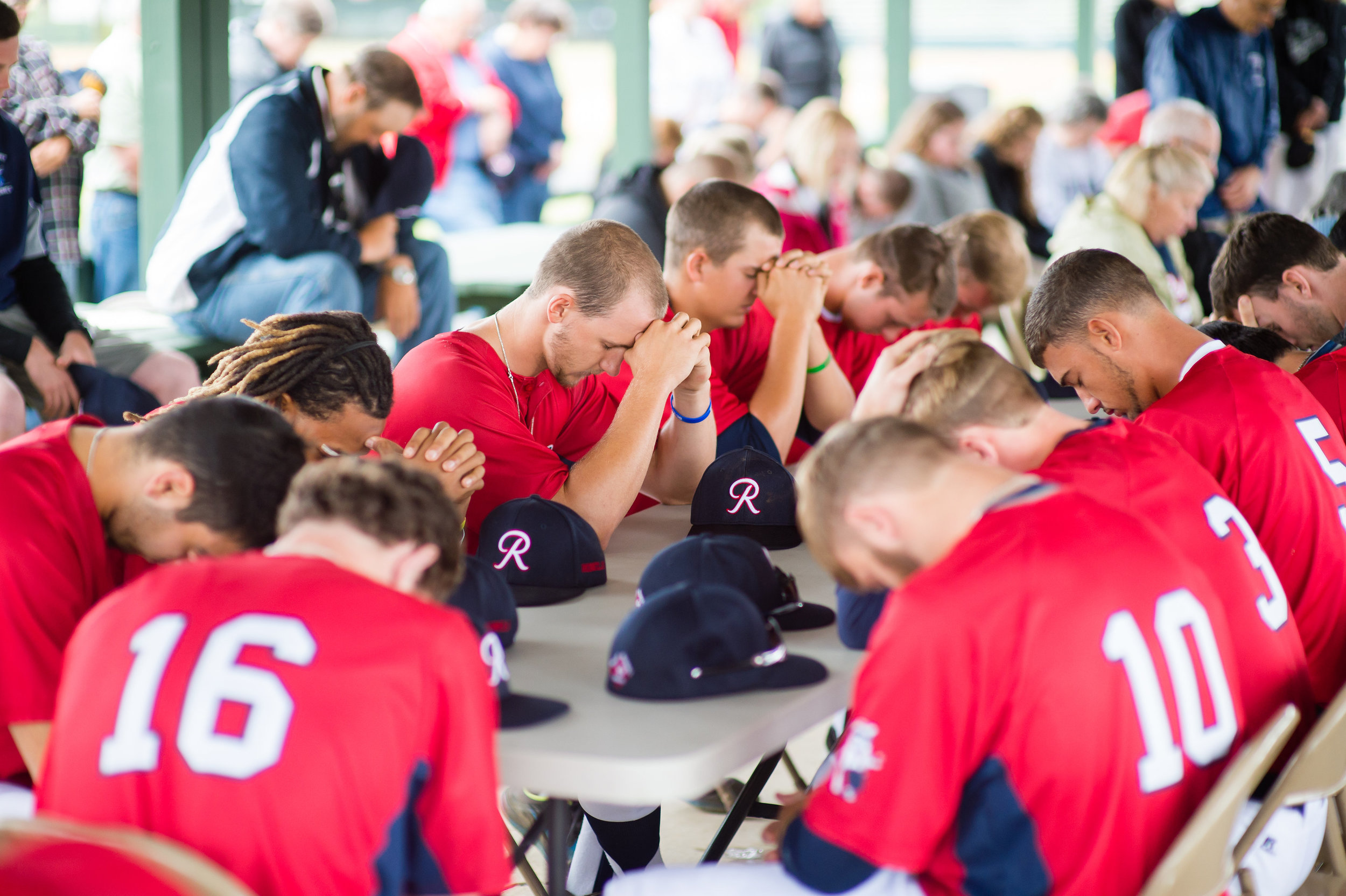
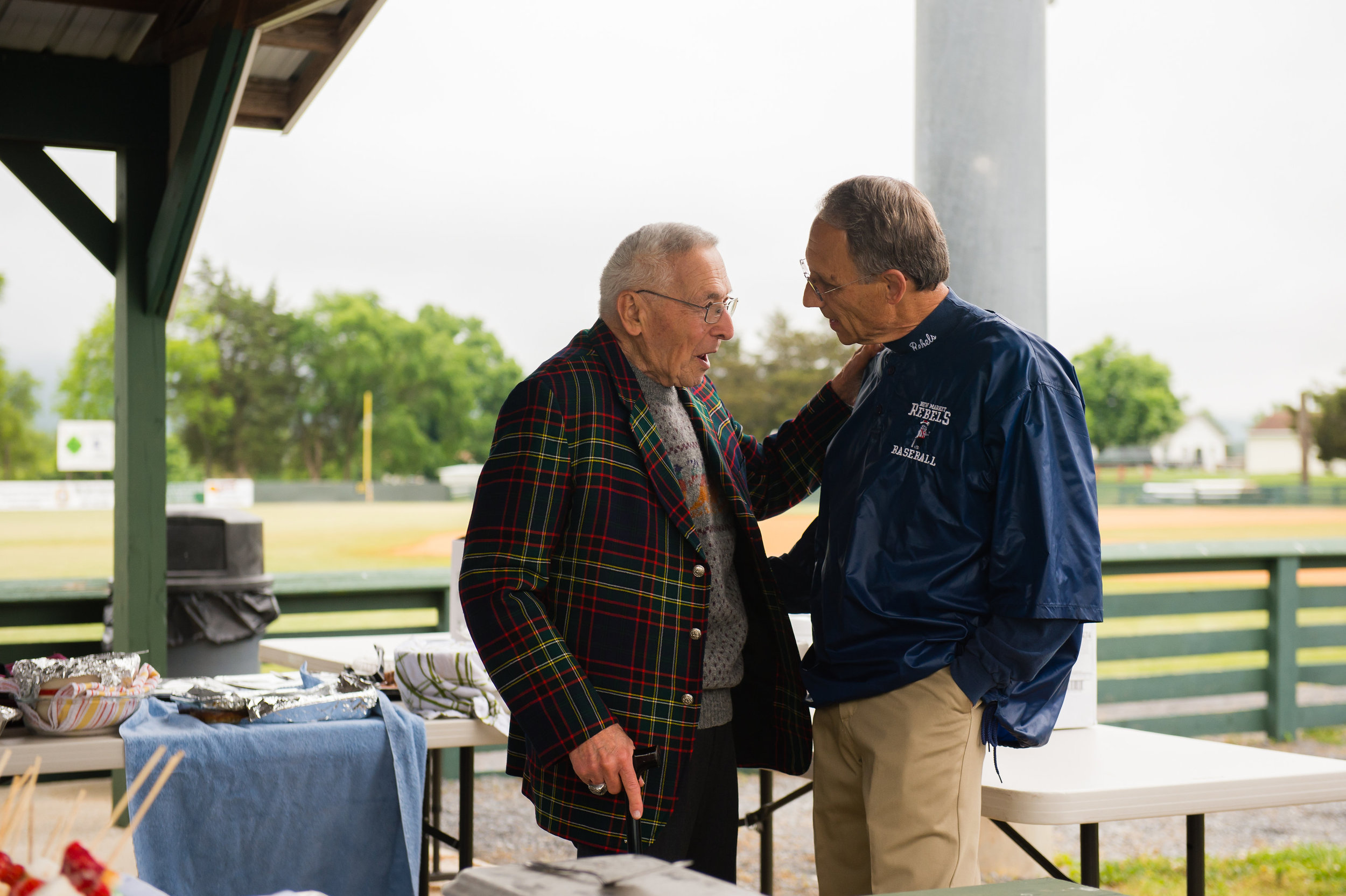
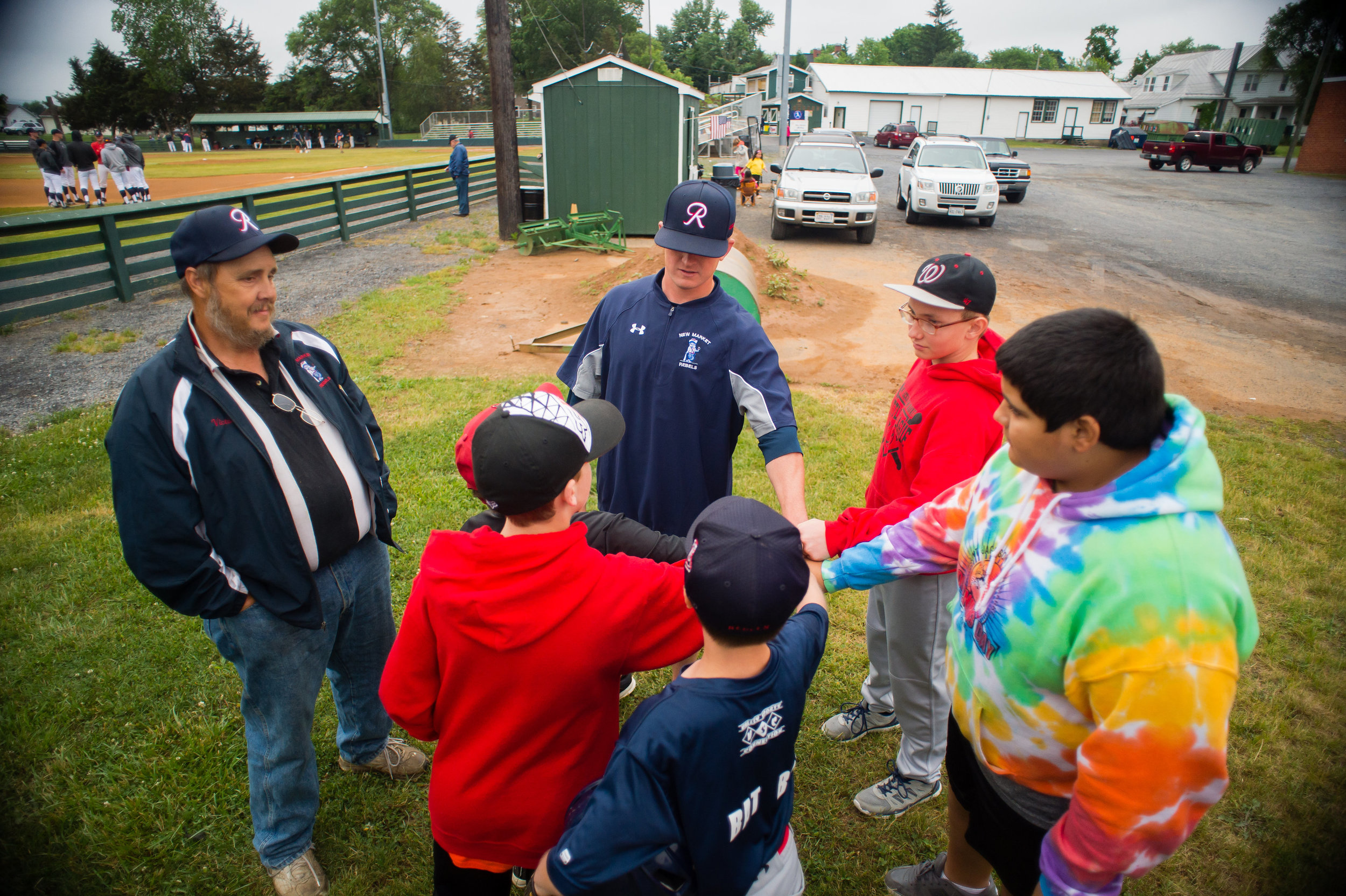
Just before the national anthem, the pitchers are standing in a circle along the third base line. Coach Stew, standing in the middle breaks the silence.
“Anyone been to the Mexican spot?”
There is some chatter, but no one has had the guts yet to stop in. There is some anxiety a few minutes before the first game. Stew tries again to calm their nerves, and turns to Burch.
“Anybody got a good joke? Burch, you got one?”
The beauty of Burch’s humor is its honesty. He isn’t trying to be funny, really. He just is. And for the first and likely last time all season, Burch doesn't have a one liner to ease tension and crack everyone up. He is preoccupied by the two big plates of barbecue and desserts still rumbling in his stomach.
Down the third base line in the dugout, George is giving his team last minute instructions about the importance of a good first impression, and making an exhibition game count.
“It really starts tonight. Show this community what we’re about,” he says.
George, when he addresses the team is speaking with conviction, making his point heard. It’s evident in the eyes of the players standing around him, who listen intently and full of the excitement of playing the first game in the Rebels uniform. There is a quiet confidence in George, and it is projecting onto the players, who have a sense of focus tonight that is razor sharp and keenly narrow.
“I’ve got a wait list as long as the new testament of guys who want to be in this organization,” he says. “Just execute.”
Tonight, each team has their own concession stand, making sure the revenue is evenly distributed to the two teams. The Shockers operate independently with no affiliation with the Valley Baseball League. JJ, sitting at the end of the bench, can’t get over the location of the Shockers’ concession stand which sits just outside the Rebels dugout, where some of the locals are congregating.
“It’s just kind of awkward,” he says, shaking his head.
While a cold front moves in, the air is thickening and with temperatures in the high 50’s, it feels more like late October than early June. The cool weather and precipitation from earlier in the day have impacted the crowd, a largely older fan base that isn’t ready to stick out nine innings in the cold. While it’s a light crowd, the weather hasn’t slowed Front Row Fred.
An elderly man, Front Row Fred has been coming to Rebels games forever. He sits, as you might imagine, in the first row behind home plate. And while he is beloved by everyone in the organization, the umpires across the Valley Baseball League might say otherwise. Fred is not shy about his view of balls and strikes, and accentuates his point with a cowbell on regular occasion, just a few feet from the batter’s box, where the umpires may get an earful all night. He watches practice, and is often one of the first people in the ballpark on game night, and tonight, the cool weather has not slowed him down, the Rebels are playing baseball.
On the mound, Burch has managed to keep his food down and is feeding the Shockers a steady diet of fastballs, who seem to have some difficulty catching up to them. When they do make contact, they are hitting right into routine plays, and the Rebels middle infielders, Roberto Rivera and PJ DeMeo, are scooping up everything that comes their way, and playing with a rhythm that’s not usual for the first game of the year. In college, Burch throws his fastball 85 percent of the time, and it seems that is not going to change in New Market. As he rears back and throws another heater, George and Stew set up at the home plate end of the dugout, leaning against the lineup card on the wall. When the Rebels are at the plate, Burch sits at the other end of the dugout, with his catcher, Brian Lau, the tall and energetic kid from St. Joseph’s University in Philadelphia who has tattoos on both arms. A hulking kid from the deep south, and an imposing catcher from the northeast who talks twice as fast have formed a bond, as catchers and pitchers do. They’re starkly different, yet bound by the 216 stitches on a baseball.
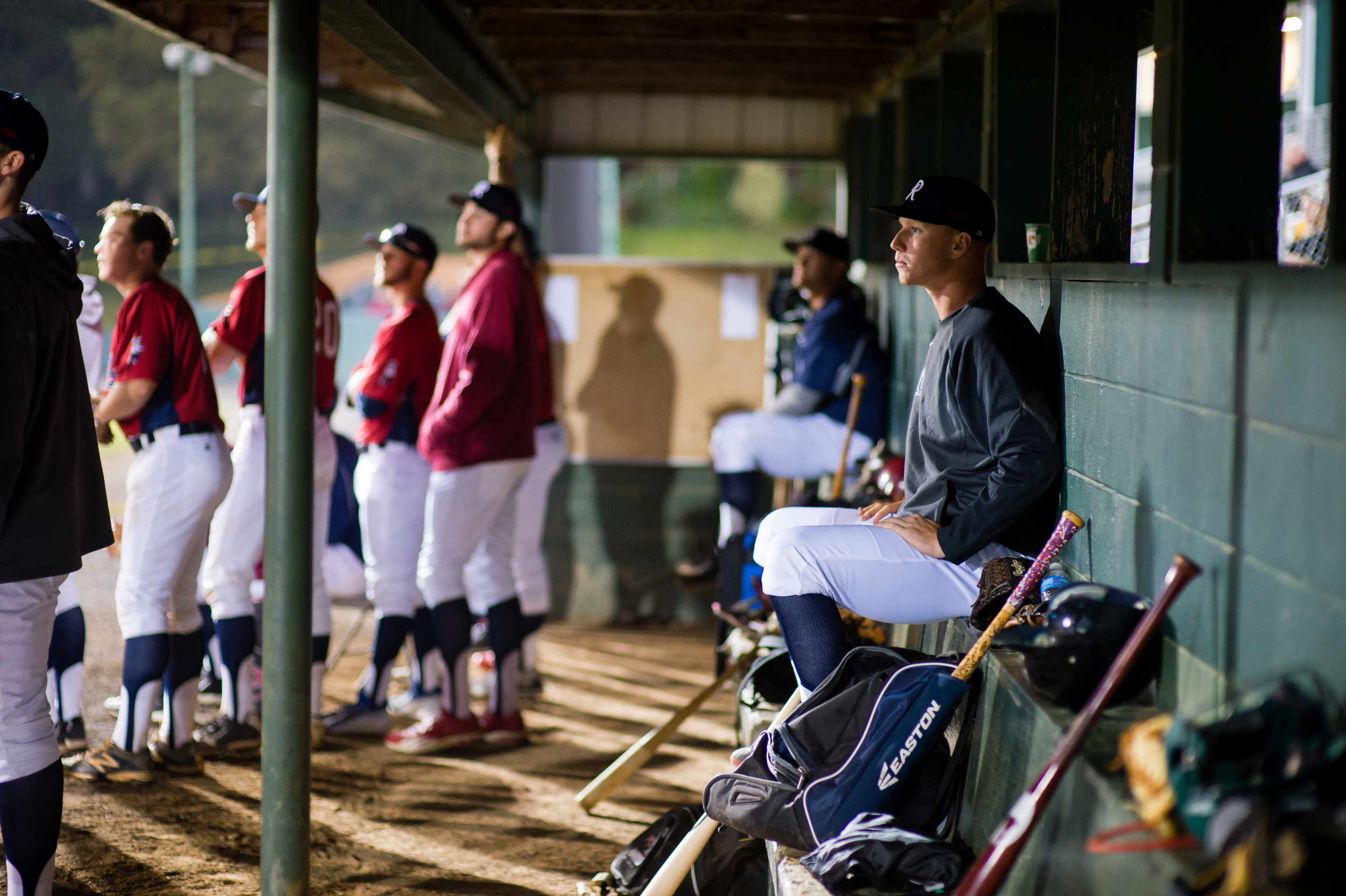
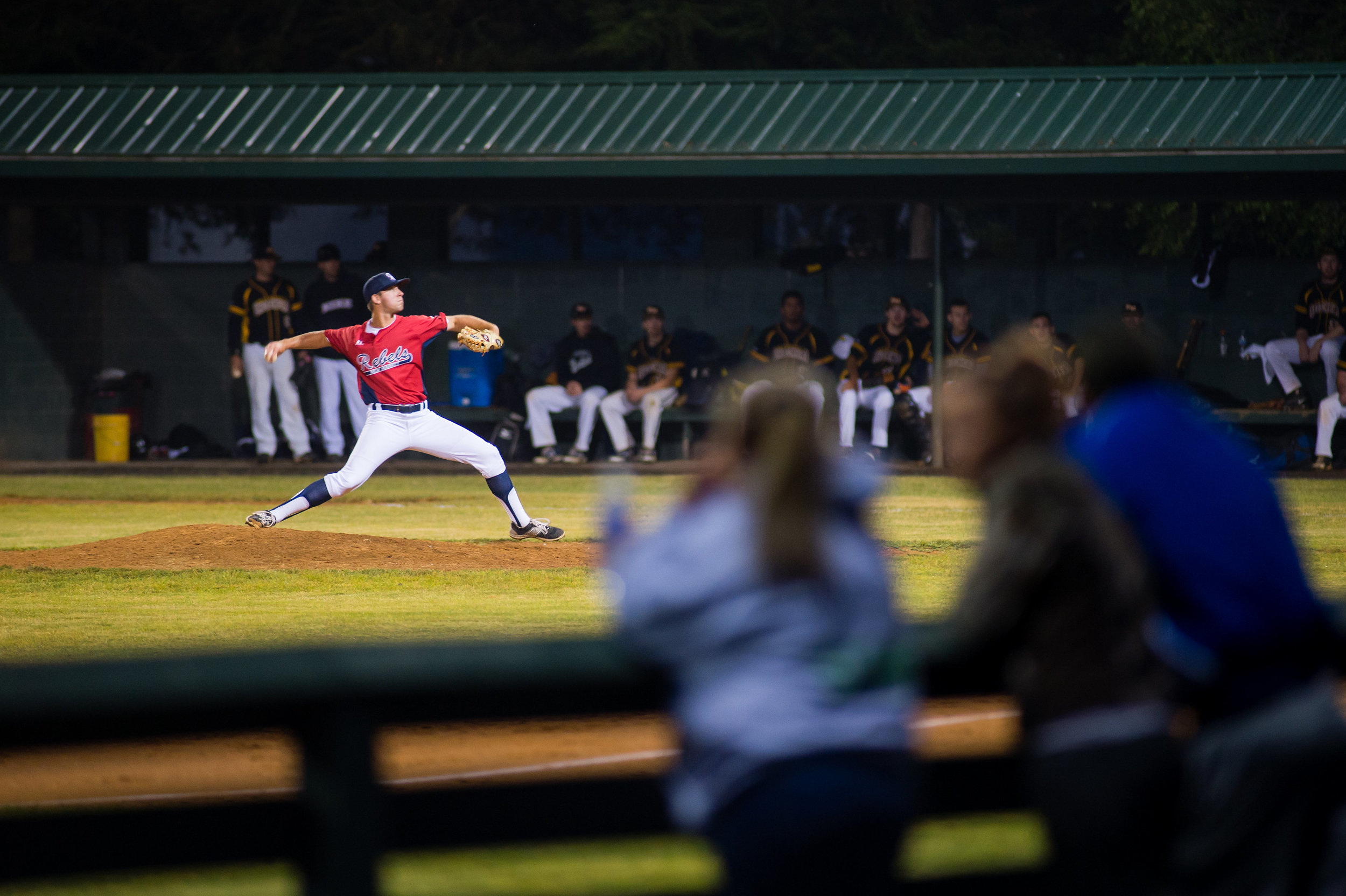
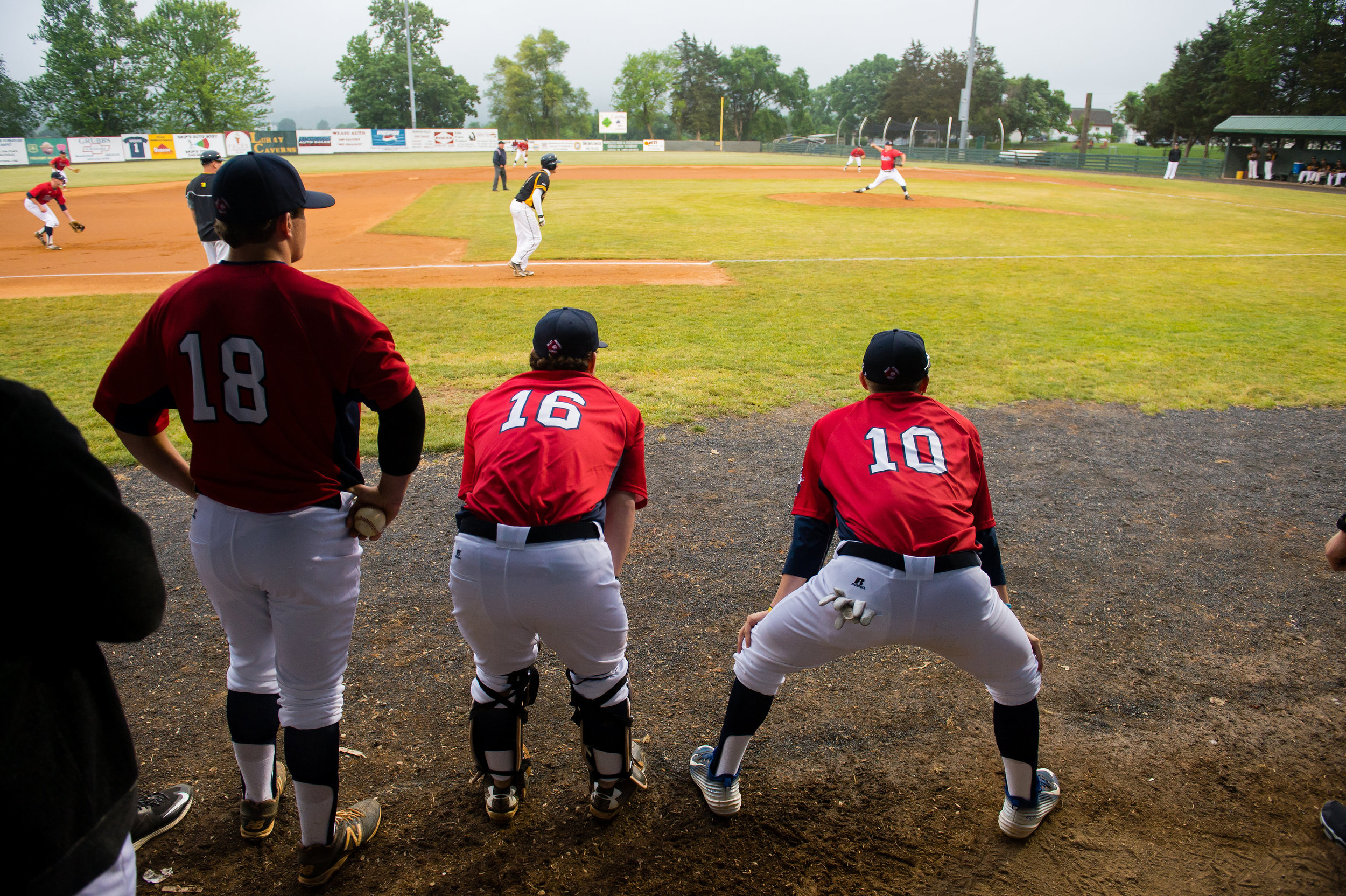
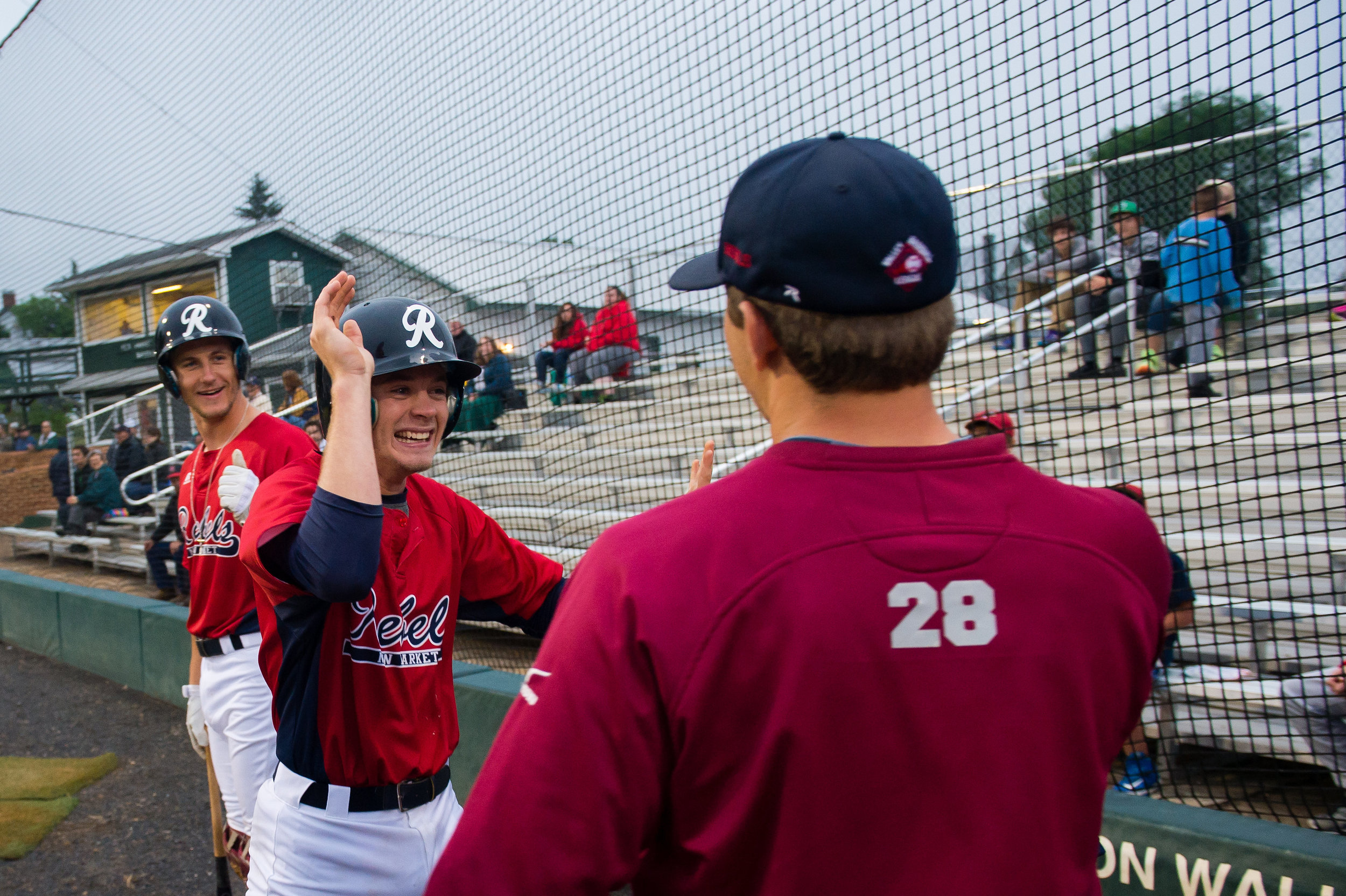
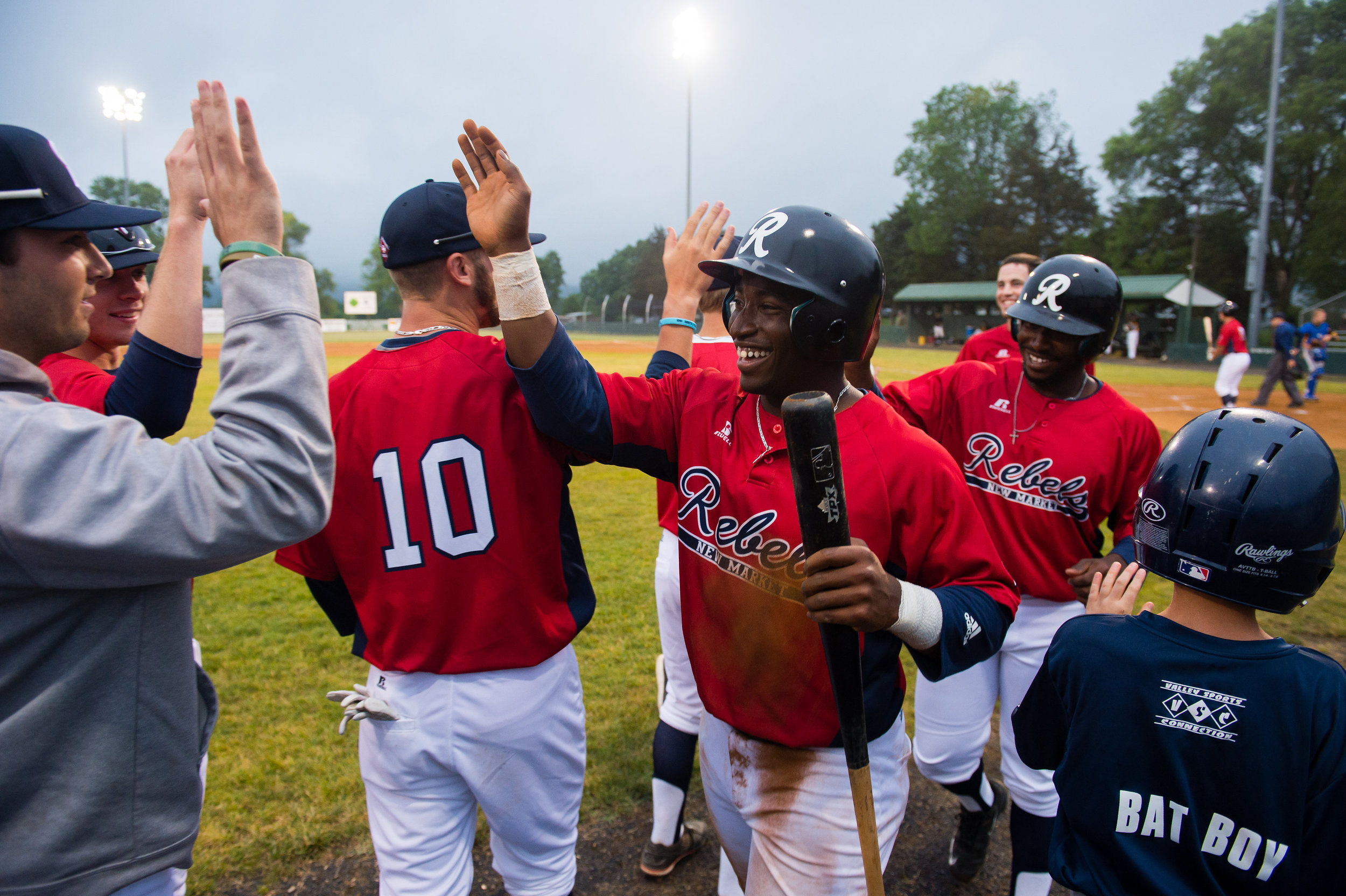
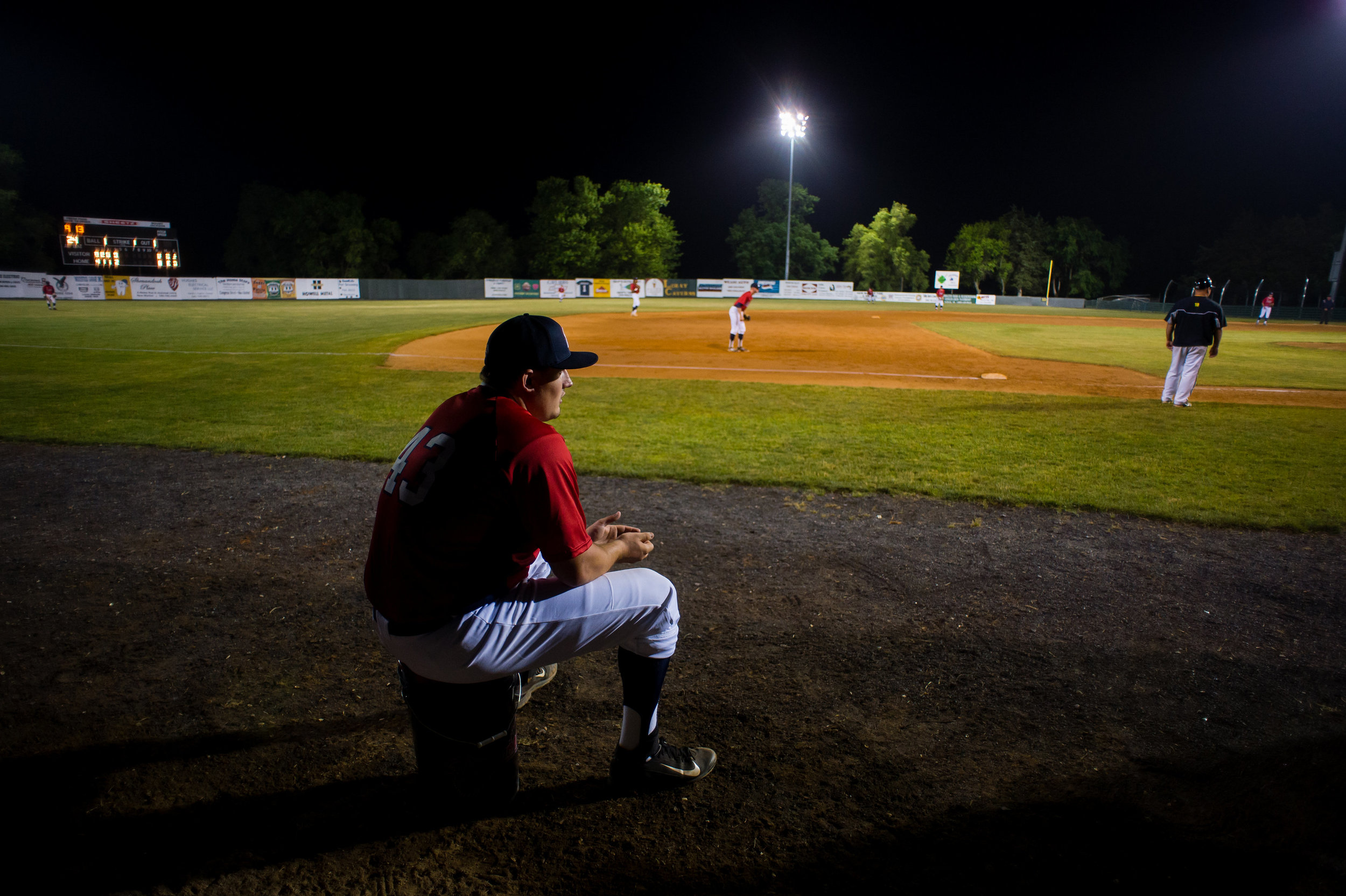
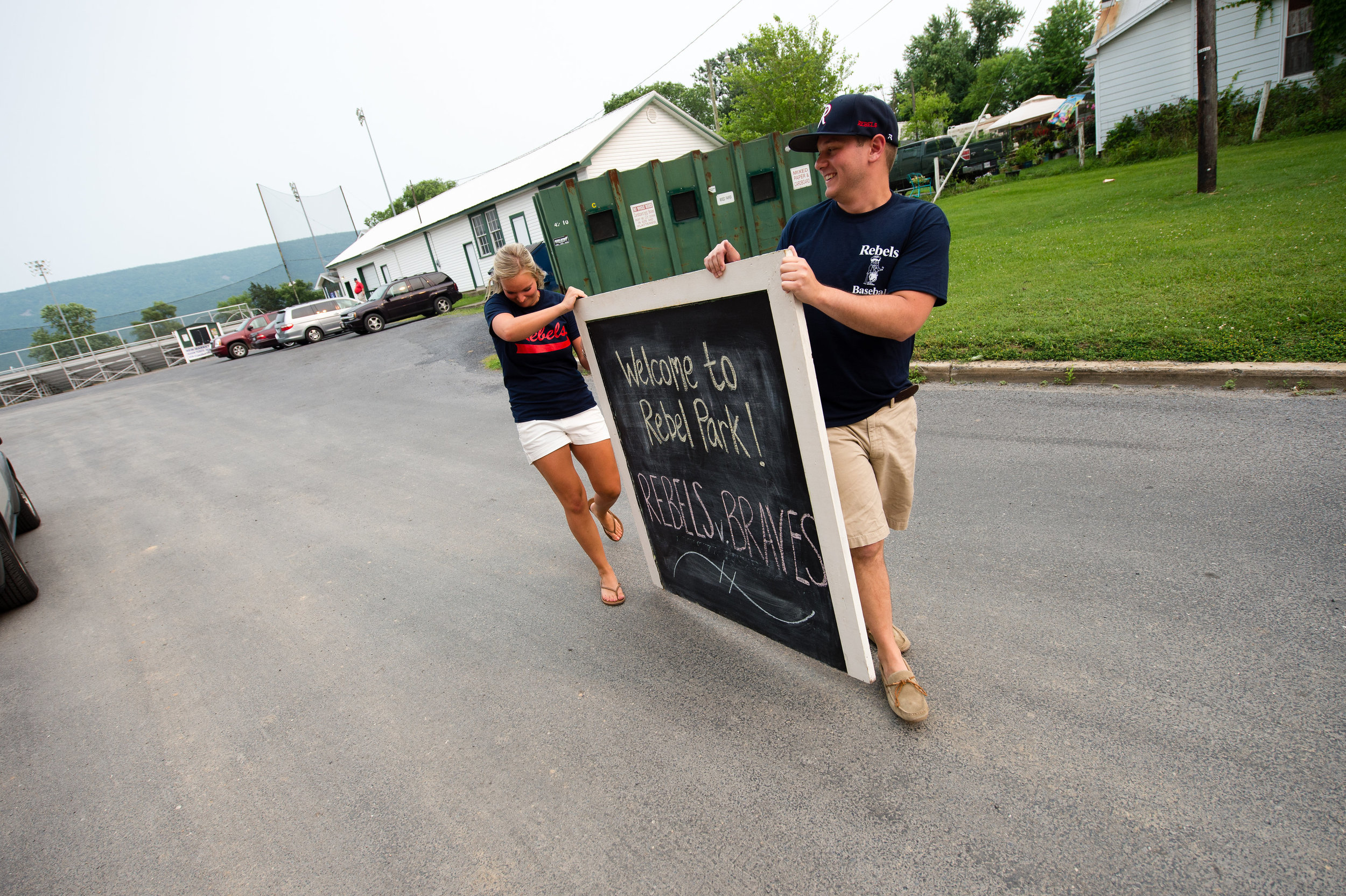
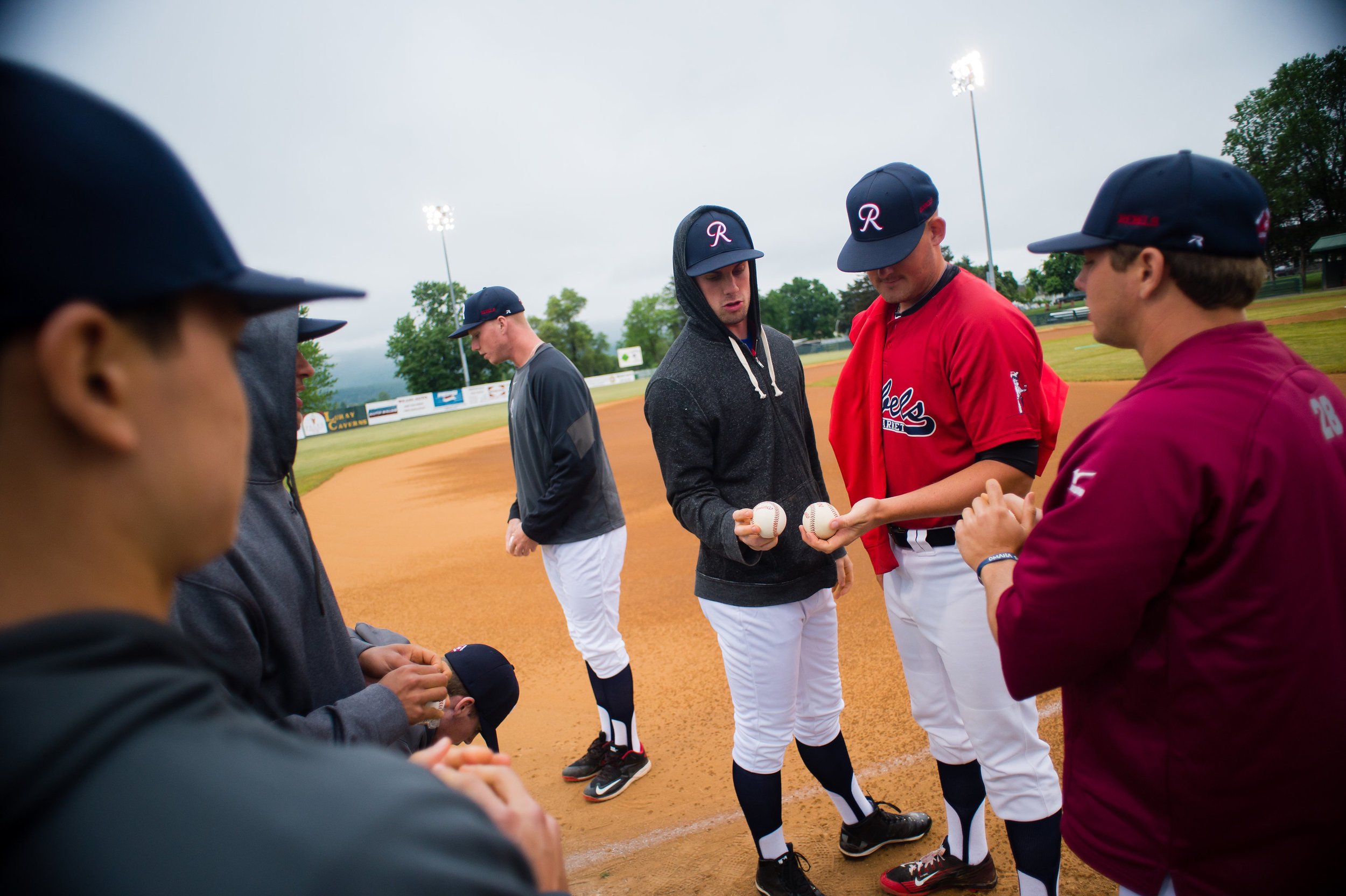
In the eighth inning, Burch is sitting at the end of the dugout, with ice wrapped on his arm, done for the night, still smiling and joking. Brian Murphy, a right-handed pitcher from the University of Hartford is putting the final touches on his second career “perfect-sit”-nine full innings without standing up from the bench. He hasn’t moved in nearly two hours. It’s evident too, that there are two different types in just about any dugout. Pitchers and everyone else. Pitchers are fraternal. They do everything together, travel together, bond together on the long nights out in the bullpen, and for the starters who play only every few days, they have to find something do to in the dugout. They’re wired a little differently from most ballplayers, something they’re reminded of often by the others on the team.
A HULKING KID FROM THE DEEP SOUTH, AND AN IMPOSING CATCHER FROM THE NORTHEAST WHO TALKS TWICE AS FAST HAVE FORMED A BOND, AS CATCHERS AND PITCHERS DO. THEY'RE STARKLY DIFFERENT, YET BOUND BY THE 216 STITCHES ON A BASEBALL.
Cruising to a comfortable win, the energy of the last few days and the newness of the season have peaked at Rebel Park. In the dugout, the energy and chemistry that was evident during the first practice continues taking shape. After every run scored, the whole team stands up in the dugout with high fives all around. Every half inning, as the Rebels pitchers walk off the mound, the rest of the team at the dugout greets them. In the major leagues, players are playing in the shadow of nine figure contracts and these things largely do not matter. But below the baseball surface, down in the amateur ranks of America’s pastime in towns like New Market, these are the things that count. It is a promising sign for Bruce, who knows that for most Valley League teams, success is largely determined in the first week of the season, setting the tone for the rest of the way.
“It’s unusual, they don’t splinter off in 1’s and 2’s,” he says of his team.” They’re always in groups of 4,5,6. The way they’re laughing and joking, we’re probably a week or 10 days ahead of schedule.”
**********************
Thursday, June 4th
5:30pm
The clubhouse at Rebel Park is, you might say, cozy. The concrete floor, stonewalls and wooden-box lockers are as basic as it gets, and reminiscent of a baseball era long gone. But this summer the coaches have made it a sanctuary for the players, a home away from home where they can think about baseball. There’s a foosball table in the corner, a small card table in the other where they’re huddled over games of spades and their Instagram accounts. There is even a beat-up couch which Katie was able to secure after reaching out to the community on Facebook. Tonight, two hours before the season opener, this locker room is buzzing, and some of the players, mostly out of nervous anticipation, already have their uniforms on. PJ DeMeo, a fast talking infielder from the University of Pittsburgh who is somehow always in the middle of the conversation, is having a hard time holding back his excitement. When George walks out of the coach’s office to put the lineup on the clubhouse wall, PJ is there. PJ is in New Market this year for one reason: playing time. At the University of Pittsburgh, he is stuck on the roster behind upperclassmen that dominate the innings. And PJ, like all young ballplayers, hates watching baseball from the bench. He’s a kid with boundless energy, evident from the first night they played stickball in left field.
With energy, chatter and music filling the clubhouse, George sits at his desk around the corner in the coach’s office studying the league rulebook. Stew is sitting on the table he’s perched on most afternoons, while JJ, always a stickler for the weather, is checking the radar on his phone. It is opening night, and they are quiet and calm when an older man with a faded ball cap and notebook in hand steps into the office unannounced.
Gene Kerns is the man every player in the clubhouse-if they knew who he was-would want to talk to. An area scout with the Atlanta Braves, he has stopped in New Market to give the Rebels a look. Gene has culled talent from the Valley League before, discovering Dodgers pitcher Brandon Beachy seven years earlier on a mound up the interstate in Woodstock. A few years after pitching in the Valley League, Beachy was starting a playoff game for the Braves in Atlanta. Gene is what’s called a bird-dog, the scout who criss-crosses a region watching players in high school, college and leagues like this, searching for the next level of talent, and his brother played for New Market 41 years earlier. As the music continues thumping in the clubhouse, Gene and the coaches start talking about the roster.
“You might like the guy we’re throwing tonight, from UNC-Pembroke,” Stew says, selling his opening night pitcher, Alex Britt.
Britt is what baseball people call “crafty”-a pitcher who lacks overpowering strength or size, but uses the tools he does have to get hitters out with efficiency. Scouts love crafty.
After the coaches leave their office, they have congregated behind home plate to tackle a tradition that has been built here. The Rebels script “R” painted in the grass behind home plate every year is the responsibility of the coaches. George and the staff, understanding the importance of the job, have been putting it off since they arrived. With the time before the first pitch now measured in minutes and not days, they can’t put it off any longer. As they gather around the spot behind home plate, Coach Reilly holds up his hat as a guide, while the George and Coach Chinners paint it freehand.
“It’s not terrible,” Nick says with wavering certainty.
“What do you expect, we’re doing it freehand,” George says.
“It looks good,” Katie assures them with some doubt, leaning out of the press box.“Stop messing with it.”
Across the parking lot, players begin trickling out of the clubhouse when The Charlottesville Tom Sox arrive. The newest member of the Valley Baseball League, the Tom Sox are based in the affluent shadow of the University of Virginia. Their resources are plentiful, and it’s apparent when they pull into the parking lot in a large chartered bus with the team’s logo wrapped around both sides. For the Rebels, the team bus is an old school bus without air conditioning named Johnny Reb. The Rebels and Tom Sox couldn’t be more opposite. As the Tom Sox step off their bus, their bright, brand new uniforms earn a few chuckles. JJ can’t resist.
“At least we can find ‘em if the lights go out,” he says.
Tonight’s game, in many respects, is going to be old vs. new, but George is relishing the contrast.
“They’re gonna show up in their new uniforms and flashy bus,” he says grinning, stepping out of the coach’s office. “And we’re gonna whoop their ass.”
Most of the afternoon, Bruce’s phone has been ringing, as locals have been checking to make sure tonight’s game is still on. The weather, as it has the last few days, isn’t looking good. But when it is time to play baseball, somehow, the threat of rain has dissipated. With the press box at capacity with team officials and two local newspaper reporters, Bruce settles into his seat in the right corner for his usual game duty as public address announcer. The national anthem was over, and while players lined the dugout, the fastball Alex Britt threw across the plate for a strike meant that baseball season, after ten months of hibernation, was awake again in New Market.
There weren’t many opening night nerves, as the Rebels played a clean and consistent game on the mound and in the field. With a light mist falling and temperatures hovering in the high 50’s, it didn’t feel at all like summer, but the smack of the ball on the bat said otherwise. PJ channeled his pre-game energy into a two for three night at the plate and solid play in the infield.
In the bottom half of the 8th, Ryan Kelly, a pitcher from St. Joe’s entered the game and it quickly turned into an inning he would just as soon forget. He struggled with his control and walked three batters, giving Charlottesville the opportunity to even the score. After a visit from George on the mound, Ryan left the game and walked slowly to the dugout and sat silently on the end of the bench, while his teammates gave him the space he needed to come to terms with the rough inning. Pitchers tend to take struggles pretty hard, and for a 20 year old who has not fully grasped that rough nights are part of the game, it is even more concentrated. Storm Edwards, the strong armed right fielder from N.C. State, managed to save the inning when he caught a fly ball in right field and uncorked a throw that nailed a Charlottesville runner at home for the third out. The Rebels dugout jumped to their feet and Nick’s eyes got really big, seeing for the first time, the potential in his right fielder.
THE FASTBALL ALEX BRITT THREW ACROSS THE PLATE FOR A STRIKE MEANT THAT BASEBALL SEASON, AFTER TEN MONTHS OF HIBERNATION, WAS AWAKE AGAIN IN NEW MARKET.
“Now I see why you’re at NC State,” he says smiling, patting Storm on the back.
In the 9th inning, Justin Robarge nailed down the 4-2 win with a 1-2-3 inning for the save. It was good, fundamental baseball with timely hitting but despite the win, not everyone is happy. Keenly aware of the microscope they‘re under, players in the Valley League have a tendency to live and die with each at bat. Lorenzo Wright, one of the brothers from Charleston, SC was less than happy with his 0-4 performance at the plate. A win is nice, but it doesn’t mean a lot here if the scouts see you strike out three times. After a third strikeout, Lorenzo returned to the dugout with the frustration draped across his face. Trace Hagler, a pitcher from UNC-Pembroke, walked over to him to give him reassurance. “
“You ok?” he asked.
Lorenzo wasn’t ready to talk, so he nodded. He’d get another shot at it tomorrow.
Standing outside the dugout after the win, George addressed his team, explaining the importance in learning from their mistakes. The players put their hands in, and JD Waite, a pitcher from Lander University, couldn’t hold back.
“We’re becoming family, y'all,” he said, raising his hand. “1-2-3 Family!”
There was obviously a lot of baseball left, but winning a season opener always sets the tone. At 1-0, it is hard to temper the enthusiasm of 28 young men who know they are playing for their baseball futures. Baseball seasons are notoriously long, but in the Valley Baseball League, it’s 40 games over just less than two months, so time is not something they have a lot of. Late that night, George made sure to send a congratulatory text message to the team. Great job tonight. Keep it quiet, it said. Don’t flaunt it.
**********************
Friday, June 5th
10:20am
Less than 12 hours after closing up the ballpark for the night after the season opening win, Bruce Alger is in the ballpark’s concession stand. Sitting in a plastic lawn chair against the wall, he knows it is easy to get excited after a season opening win, but in 50 years with the Rebels organization, Bruce knows better. If there is one thing that is standing out to him this early in the season, it is the focus on their faces through the first five days in town.
“They’re a hard working group. Those are the kinds of things that get overlooked, it’s very impressive,” he said, leaning forward in his chair. “It tells you a lot about the character. They’re here to work and to play ball.”
Already, the New Market Rebels of June 5th already appear to be vastly different than the New Market Rebels of June 1st.
“That’s the change,” he said. “They’re morphing into what we need them to be.”
For the first time since the players have arrived, the sun is out and it’s shining brightly. It is an off day today, with optional stretching and hitting for those who want to take the extra swings. Nick is in the cage with a small group talking about last night’s College World Series. Stew is, as always, out in the bullpen, monitoring his pitching staff, who are stretching and working their arms. Trace Hagler, the slender right-hander from UNC-Pembroke and Burch are debating the merits of dirt track vs. asphalt racing. Across the diamond in the visitor’s dugout, George is on the phone with an Iona baseball recruit. It’s relatively quiet for a field full of players, and while everyone is excited to get their first win under their belt, there’s a quiet confidence in the way their going about their work.
**********************
Sunday, June 7th
5:25pm
After a Saturday night win on the road at Staunton, the New Market Rebels are playing loose but disciplined baseball in the season’s first week. They’re 2-0, with the same quiet confidence they had two days before.
Tonight the weather is perfect, and Waynesboro, a small town on the south end of the Valley, is primed for their home opener. There’s country music blaring from the speakers, and as the locals file into the stadium, the Rebels are taking batting practice. An older man walks up the bleachers, and grinning at a group of older men, chuckles.
“I see y’all made it through the winter, didn’t ya?”
Like it was three nights ago in New Market, baseball is up and running in Waynesboro. As the Rebels take to the infield for ground balls and warm-ups, Katie has arrived to the ballpark with a tray full of 7-11 coffees for the coaching staff and if the signs along the outfield wall are any indication, Dickie Bell is the candidate for delegate in this part of the state.
Kevin Woodall, a 6’5 first baseman from Coastal Carolina is the last player to arrive for the season, and his presence has pushed Garrison Elliot, the power hitting first baseman from Auburn, from the lineup. Daniel Powers, a right-handed pitcher from William & Mary is pitching tonight for the Rebels and at 6’2, his unassuming build hides the fact he throws pretty hard. Directly behind home plate, watching every pitch is a man with a radar gun, the dead giveaway to anyone in the crowd that he’s scouting for a major league club. Whether they admit it or not, pitchers for both teams are keeping an eye on when and if the scout writes anything down in his notebook. Powers allowed three runs across five innings, and when George tapped Ryan Kelly to come in to pitch the sixth, it sent a message. It was an endorsement that he believed in Kelly, despite the tough night he had in the season opener. If Kelly wanted a chance to redeem himself, it was now. Pushing his first outing aside, Ryan promptly struck out the first batter on four pitches, and retired the side in order.
In the bottom of the ninth, up 4-3, Justin Robarge, who has solidified his role as the Rebels closer, struggled early. He walked the first batter, and with the tying run on base, the Generals Michael Brosseau doubled to tie the game at 4. As the game went into extra innings, George, JJ, Stew and Nick stood silently at the south end of the dugout. George’s eyes darted across the field and back into the dugout, looking for just the right button to push. Connor Gunn, a junior from Amherst College, dug into the batter’s box with two runners on, and a chance to be the hero. Staring at him stoically, George delivered a series of signs. Connor laid down a bunt along the first baseline, but when the Generals’ first baseman threw the ball home to get the runner, it passed by the catcher, and the Rebels took the lead. Dan Furman, a roommate and teammate of PJ’s at the University of Pittsburgh, came into the game in the 10th and closed the door on the Generals and the Rebels moved to 3-0.
Standing outside the dugout in the wake of the win, George, for the first time seemed a little rattled. He had made a couple moves that he would love to have back, but while he was relieved to get win, he couldn’t help but feel a little luck that they’d escaped one. But it did not mean he was going to give it back, either.
“The guys are pretty confident,” he said, exhaling, as if he’d held his breath for ten innings.
“We’re trying to stay loose, and promote that environment where they can succeed and be themselves.”
For PJ, the energy surrounding the team at 3-0 is undeniable.
“I think everyone feeds off each other. That was one of the best team efforts we’ve had all year,” he said, shaking hands with teammates as they left the dugout.
“This is an awesome atmosphere to be in, it’s a blast so far,” he said. “Seven days ago, I met someone for the first time, now we all have handshakes, nicknames-it’s a lot of fun.”
As the players started walking across the parking lot with bags over their shoulders, some visiting family who had come into town, and 37 games in front of them, they boarded the rickety Johnny Reb for the ride back to New Market. The sun was barely up on the season, but 3-0 was feeling really good.
**********************
Tuesday, June 9th
5:22pm
Slated to start tonight against the Staunton Braves, Josh Burchell is sitting in the front seat of his truck, priming himself for the game listening to Metallica. As he gets out of the truck, he throws his bag over his shoulder, and starts his slow and lumbering walk to the clubhouse. He’s focused and doesn’t want to jeopardize the Rebels’ perfect start to the season. He’s spent most of the day watching TV and relaxing, getting in the right frame of mind for his first real start of the year. For pitchers, rhythm is everything. Start a game well, and it can set the tone for the night. Get roughed up early and pitchers, especially at this stage in their careers, spend the rest of the night trying to get everything back. They are not quite old enough to let these things roll off their back. Burch knows what tonight's start means, but if he has got nerves, he’s not showing it.
In the coach’s office, shortly before the Rebels take the field, another bird-dog has stopped in, this time from the New York Mets. He wants to give Storm a look, and Stew and Nick give him a few more names to keep an eye on.
George is a little more intense tonight than he’s been the first three games, and battling an allergic reaction to the cats in his host home, where he lives with the other coaches, isn’t helping. JJ, with 10 minutes to go before first pitch, comes running out of the dugout after painting the field and still isn’t in uniform.
“Another day in New Market,” he says with a laugh.
In this contemporary age of baseball, pitching coaches live and die by pitch count. Pitchers routinely are cut off at about 100 pitches, regardless of how well they’re throwing, to save their arms and elbows from injury. As a result, keeping a pitch count low in the early innings is vital, especially to players this young, still developing their muscles. And in the first inning, Burch has some issues with his command, falling behind hitters, and throwing more pitches than he’d like. After a strikeout to end the first inning, Burch walks off the mound and into the dugout. His arm is labored and his body language is obvious.
“Talk to me,” Stew says to his pitcher as he sits down on the bench.
“I’m tired coach,” Burch replies. His jovial and relaxed nature has disappeared, and maybe it’s the intensity of the game or concern for his arm, but Burch isn’t smiling much. As the Rebels go to bat, he is sitting quietly at the end of the bench, staring at the floor of the dugout. It’s evident from the start the Burch doesn’t have his best stuff tonight.
In the second inning, it’s clear that whatever has been bothering Burch isn’t going away. Struggling with the command over his pitches, he gives up a solo home run, and the Rebels fall behind 1-0. After a couple of base hits and a walk, the Braves are sitting on a 3-0 lead. Watching Burch struggle from the dugout, George finally makes a trip to the mound to make a pitching change. Burch knows his night is over. He walks into the dugout, and takes his spot on bench where he stays the rest of the night, trying to pinpoint what went wrong-and more importantly-how to change it for next time.
Squandering scoring opportunities in the first couple of innings, all the momentum the Rebels had the night before seemed to be left in Waynesboro. Staunton’s ace, Garrett Ring struck out 12 hitters, leaving the Rebels hitters shaking their heads most of the night. There are a few opportunities for the Rebels to score as they get runners on with some regularity, but the strikeouts are coming at the biggest moments. JJ’s frustration boiled over in the 3rd.
“Why the hell haven’t we scored yet!?,” he shouts as he paces the dugout.
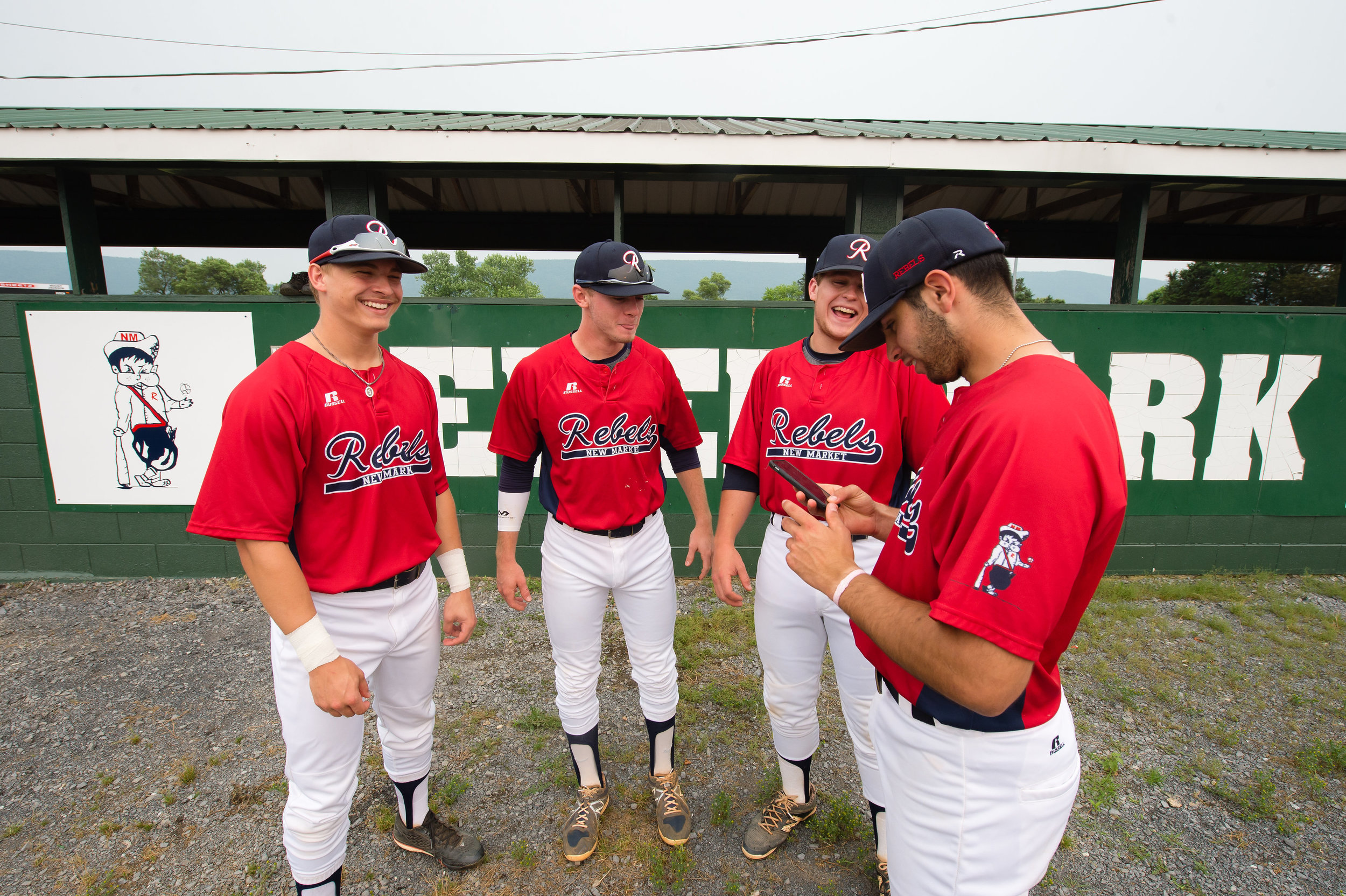
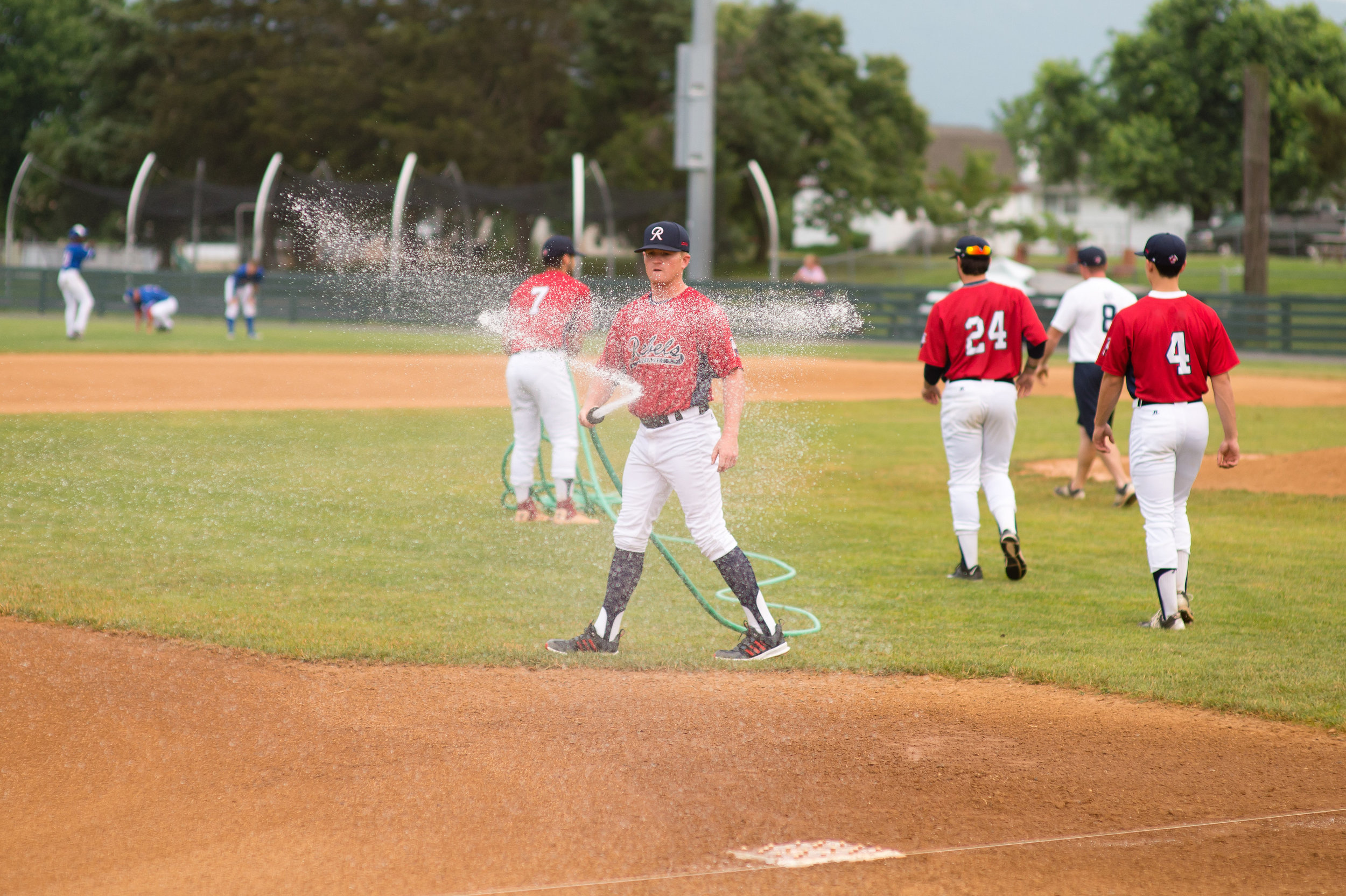
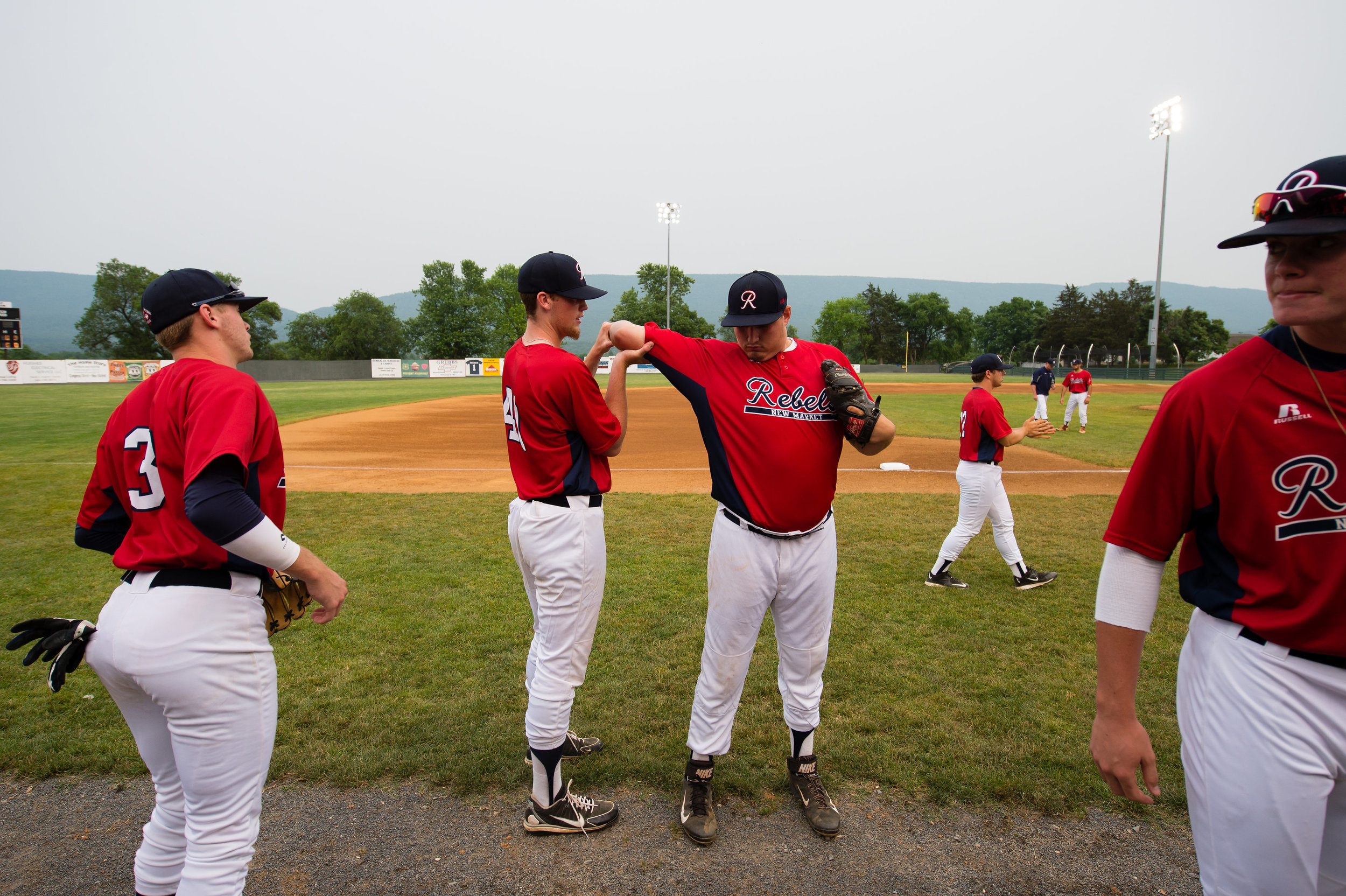
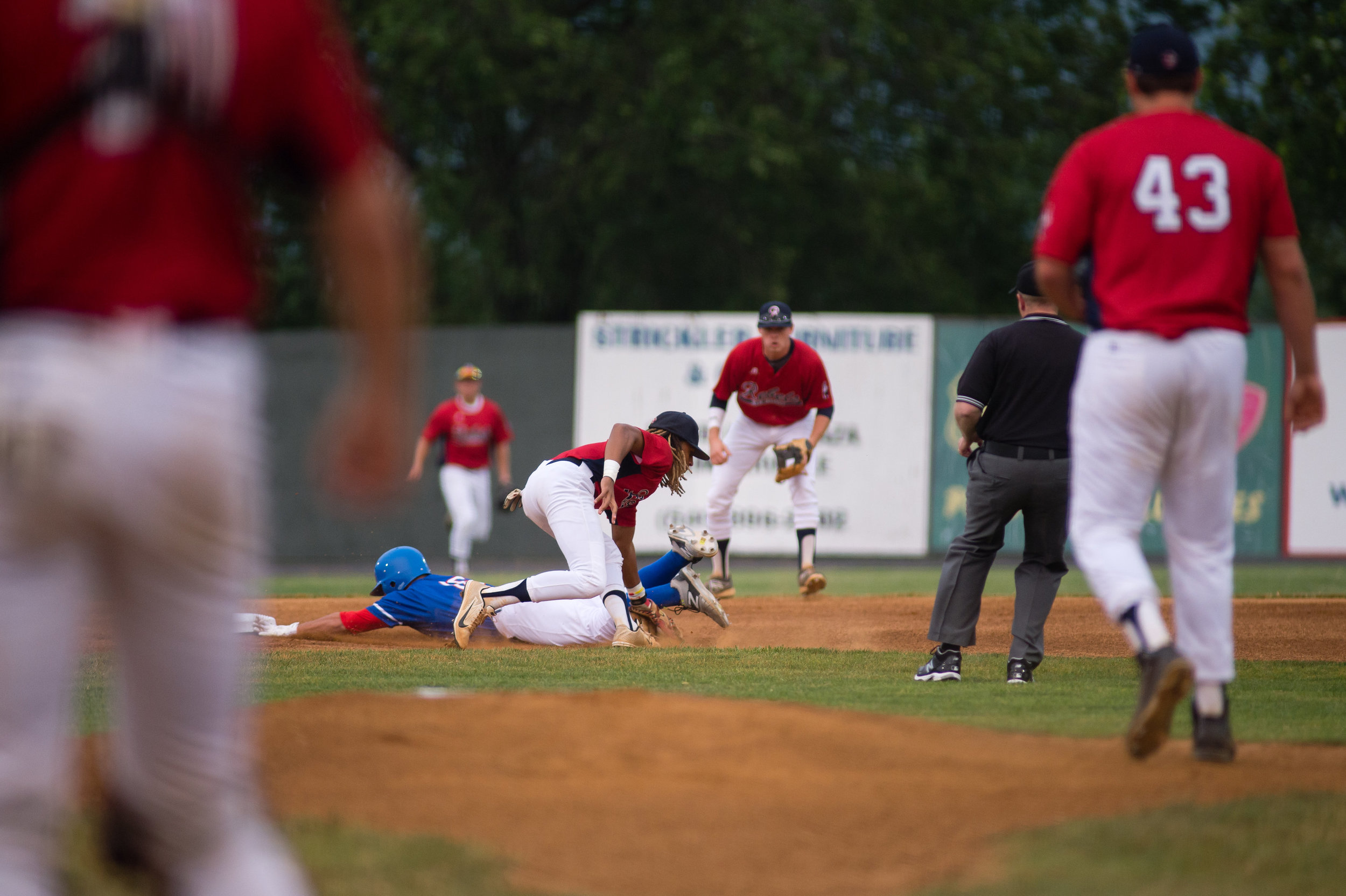
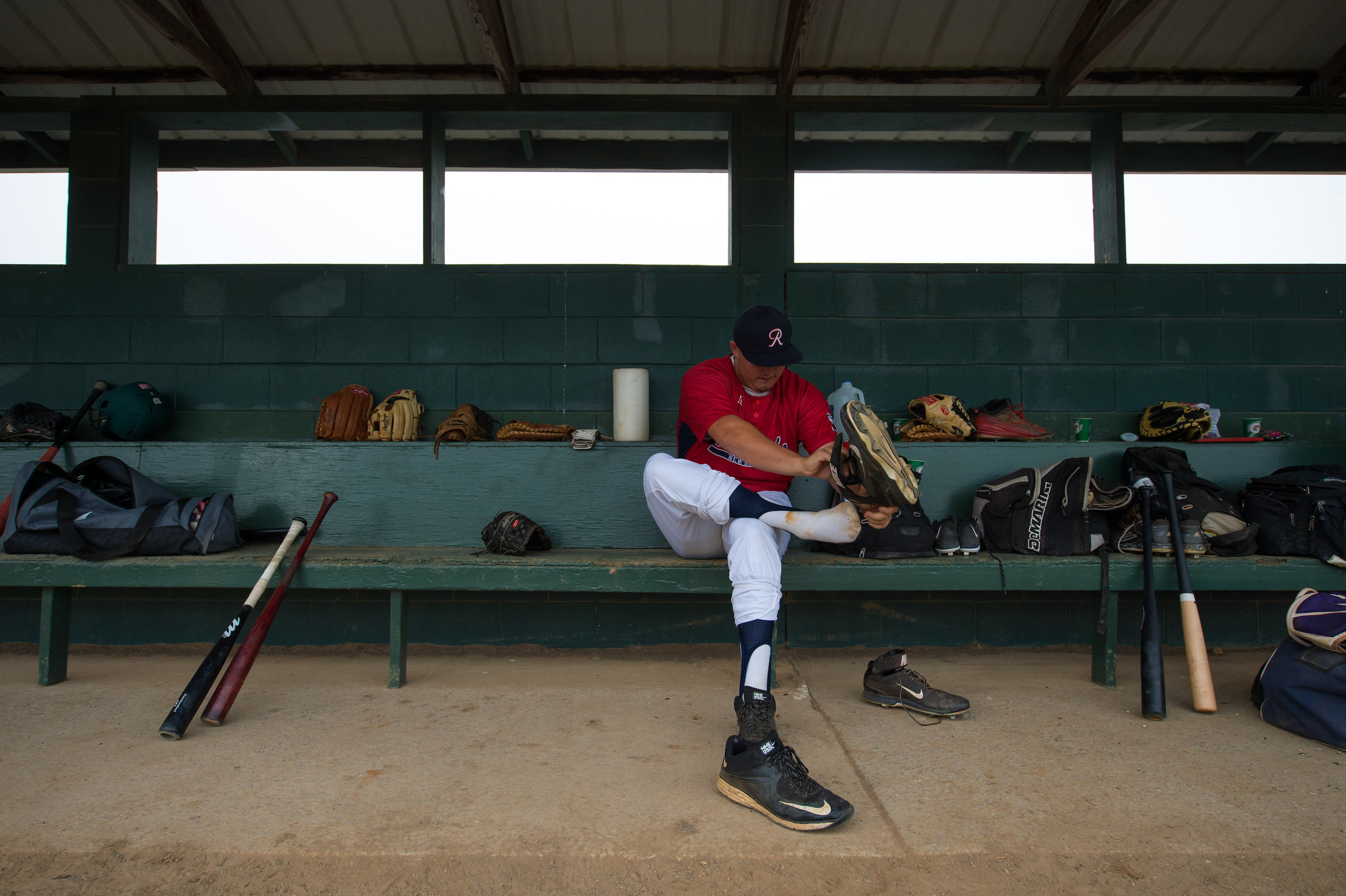
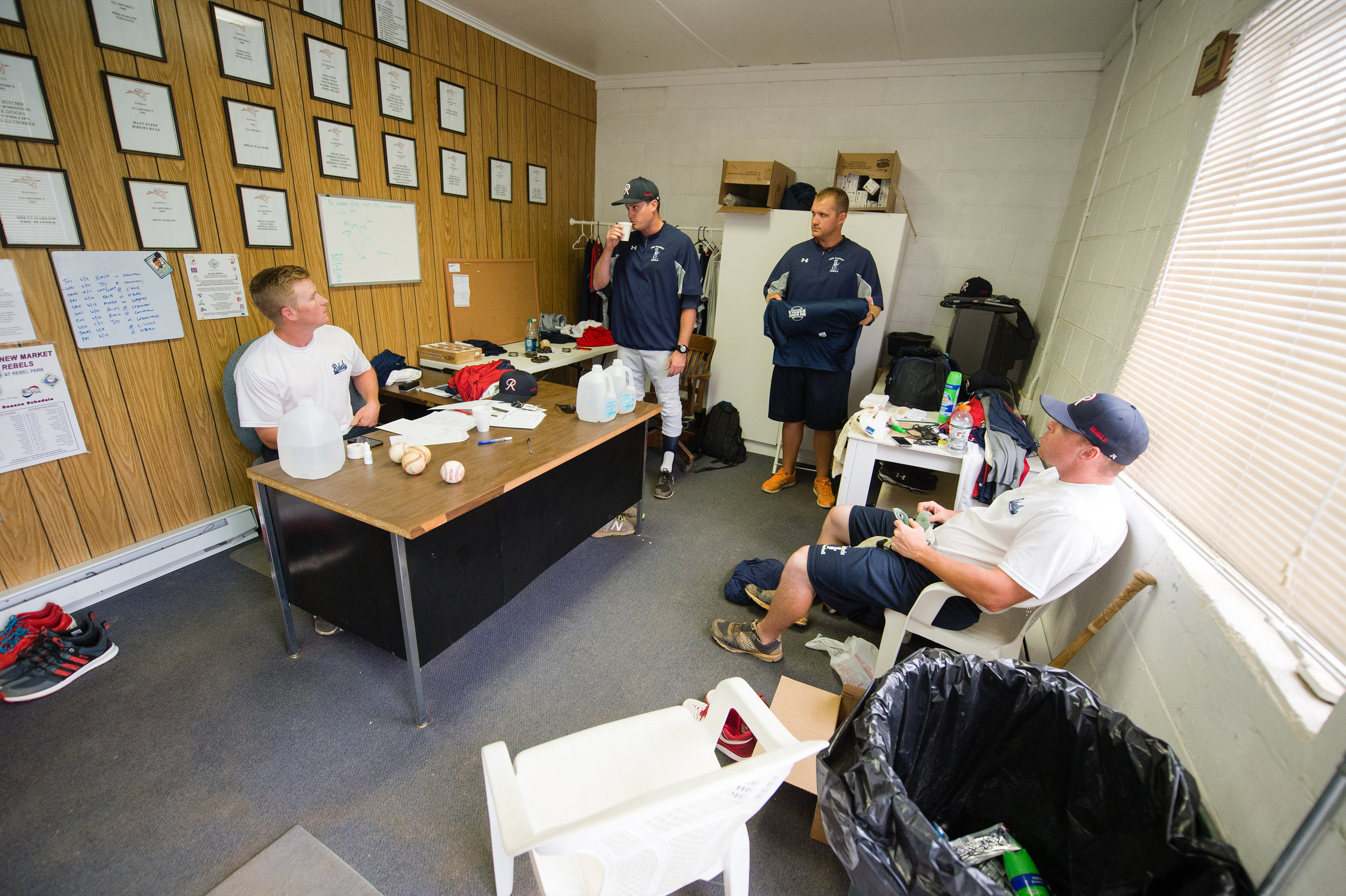
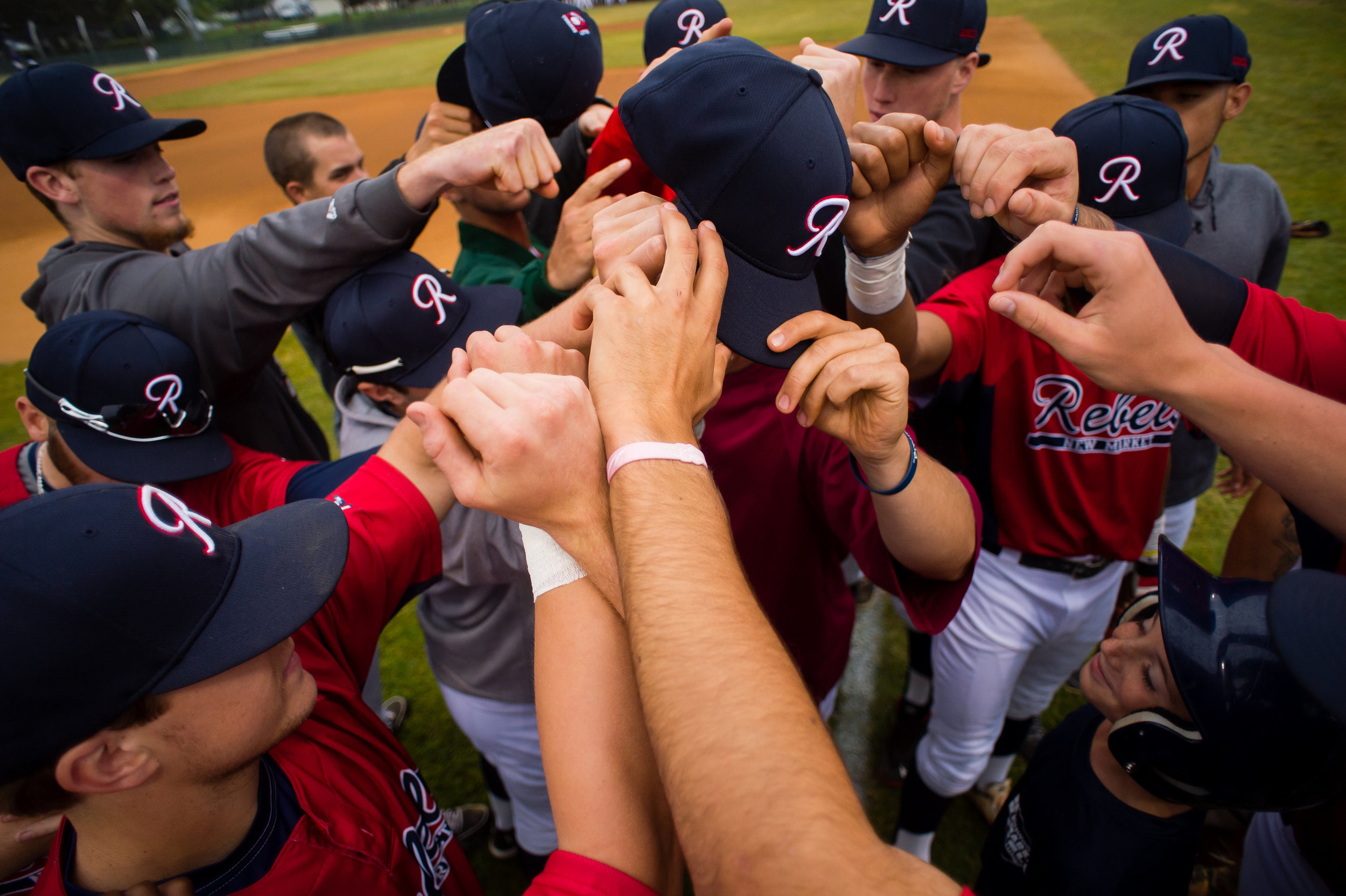
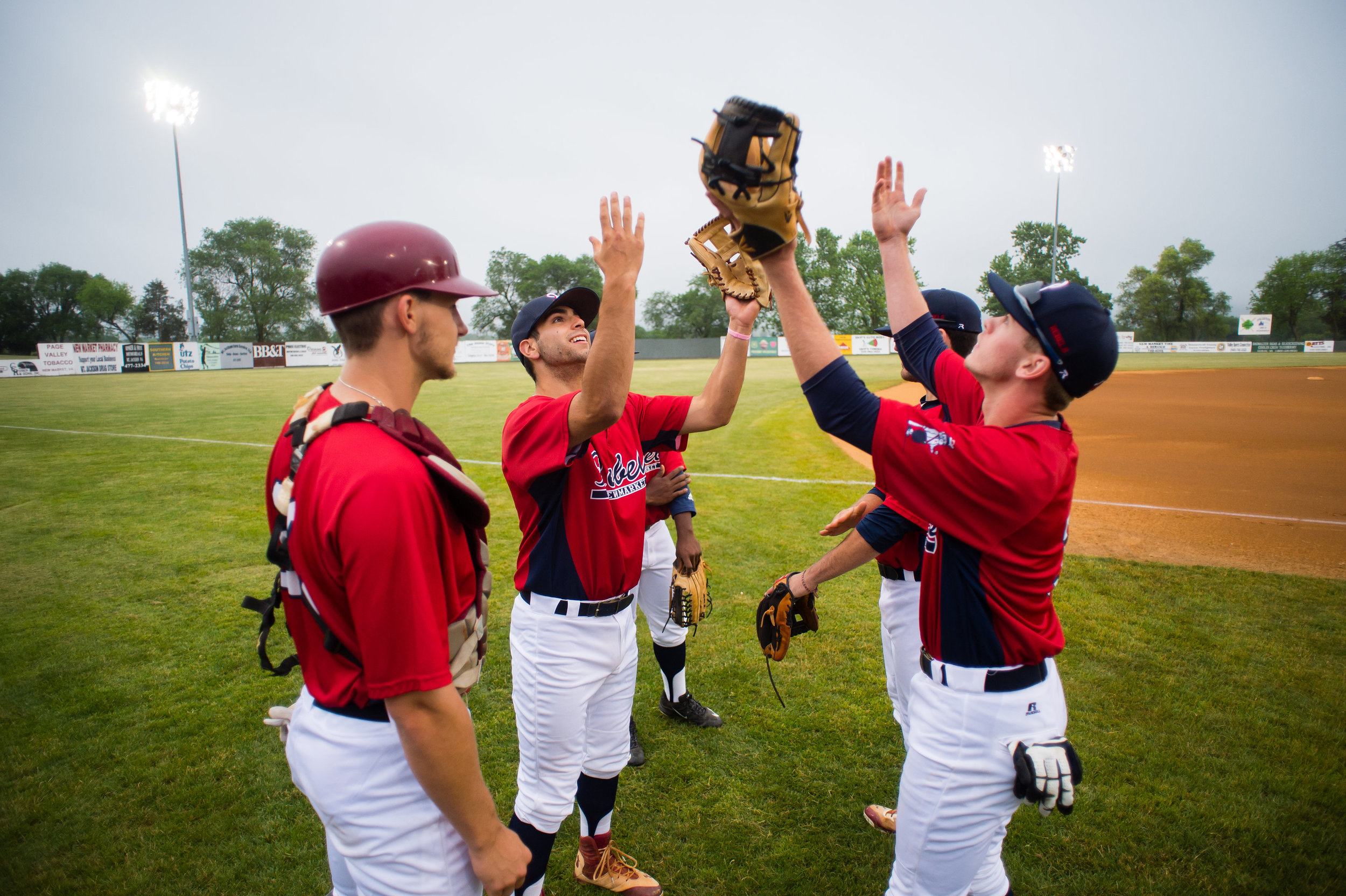
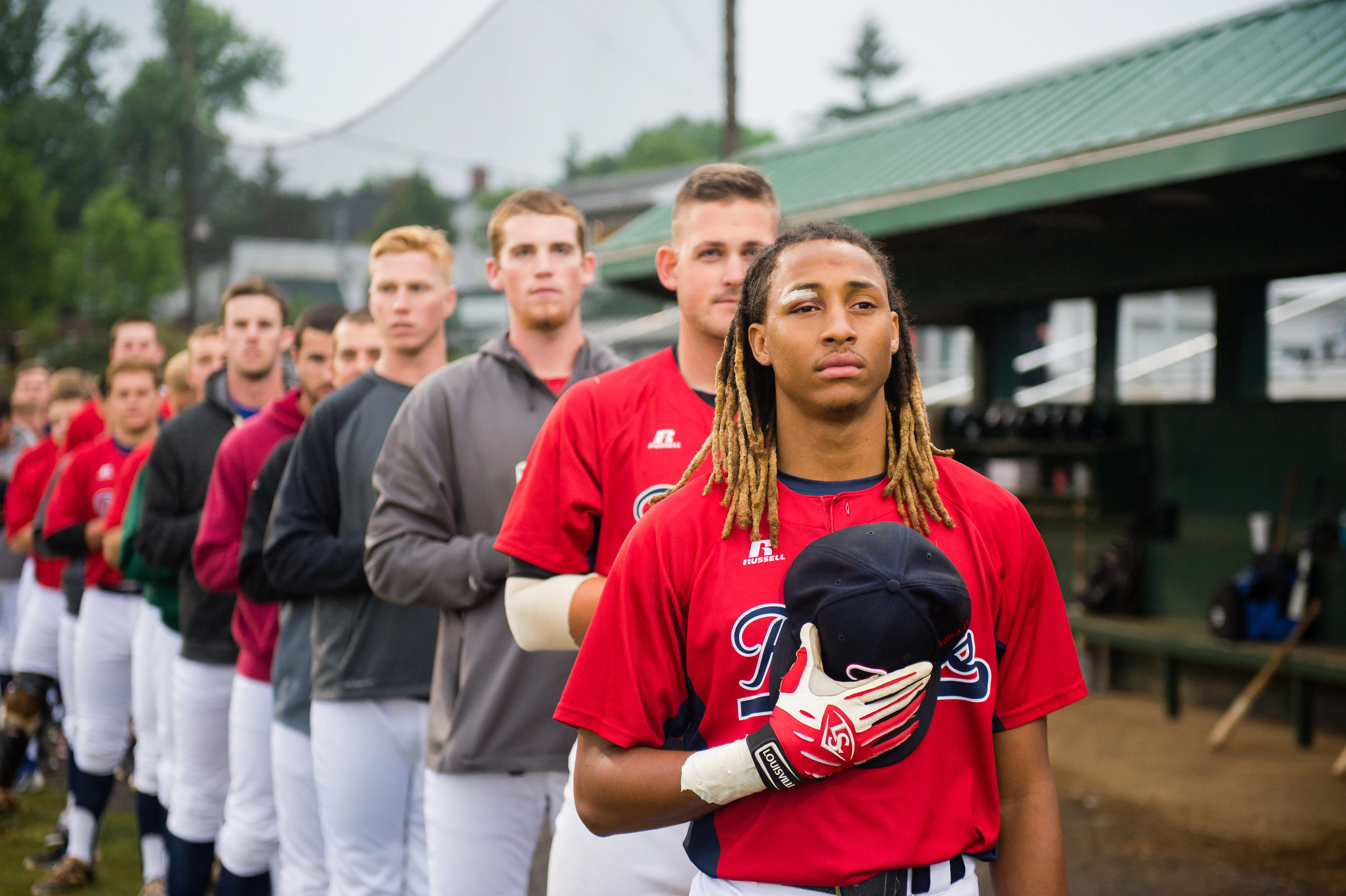
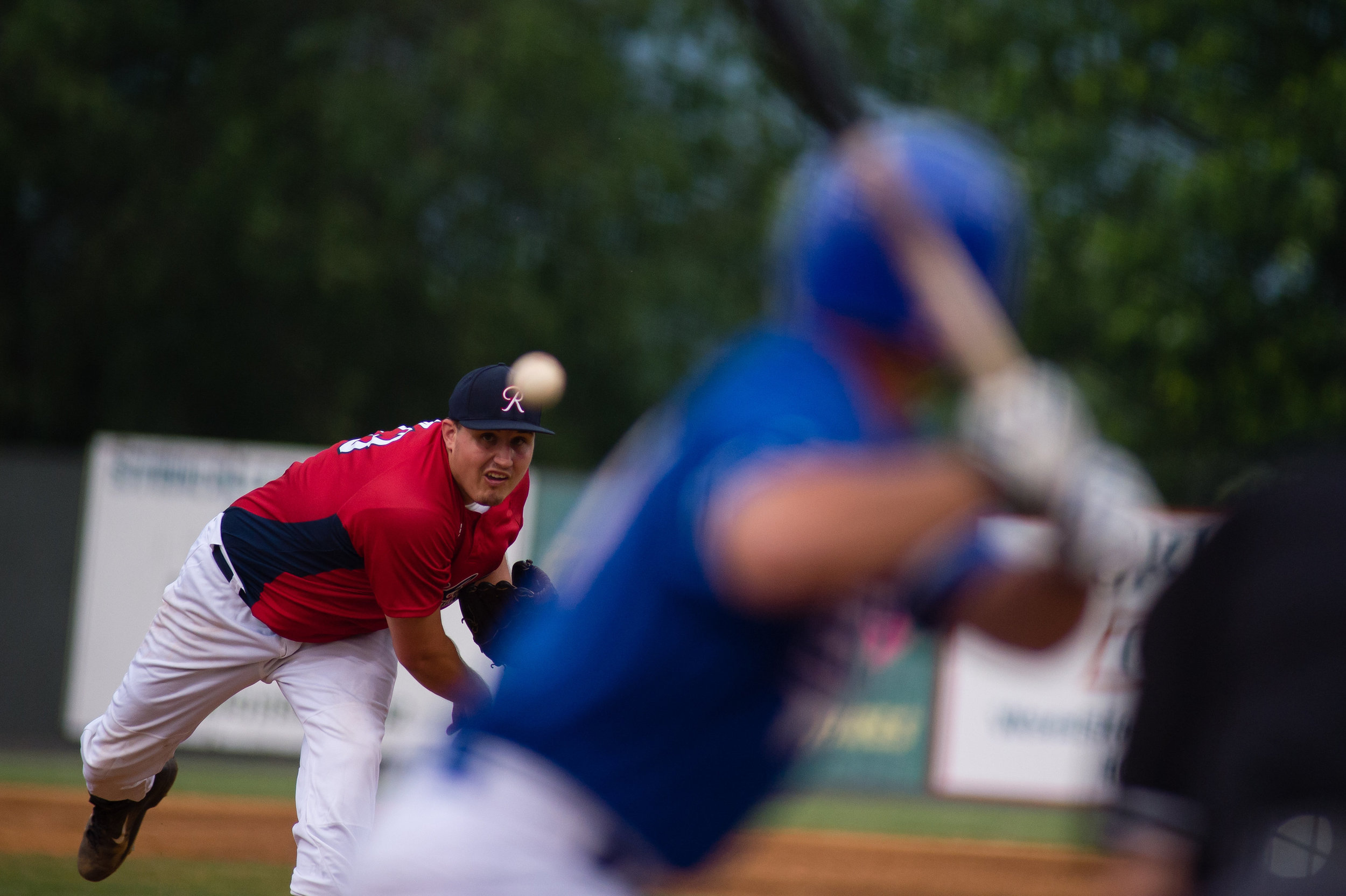
After a week of disciplined, clean, and sound baseball, the New Market Rebels are getting their first taste of adversity. They are learning quickly that not every swing of the bat falls into the gap, and not every pitch finds the strike zone. They battled the night before in Waynesboro to squeak out a big win, but tonight, there is virtually no wind in their sails. They have played flat from the very start, and on a night when Staunton is hitting everything that crosses the plate, they could not afford to fall behind early. George has left his normal post against the wall of the dugout and is sitting on the bench, trying to find the right mix of circumstance and opportunity to give the team a jolt. After Kevin Woodall is thrown out at second, and Garrison Elliot strikes out with a runner on, JJ tries a different approach. Positivity.
“Let’s go boys,” he says clapping. “Let’s go, one at a time.”
Somewhere, in the late innings, the Rebels showed some life. Down 9-0, they managed 5 runs over the last three innings, but it was too late. A night that started off on the wrong foot for Burch, ended on the wrong foot for the whole team, their first loss of the year. The real test for the New Market Rebels isn’t when they are 3-0 and playing well, but when bats go silent, strikes don’t cross the plate and adversity has reared its head.
Following the loss, the clubhouse is relatively quiet. George, Stew, JJ and Nick sit in the office discussing what exactly went wrong, and how to approach the fragility in the clubhouse around the corner. After the players filed out of the locker room, they made their way to the pavilion next to left field for the post-game meal. They talked, ate, and began the process of getting over the rough night they had all been a part of.Eating potato chips and sandwiches, there was a bit of positivity that started coming out of their conversations. Perhaps it’s their youth, naiveté or a mixture of both, but they’d already begun to move on from the struggles of tonight. What they knew though, was the night they struggle can be the same night a bird-dog with the Atlanta Braves or New York Mets is watching from the right field line. They also knew that at 3-1, they were still playing some of the best baseball in the league, and they had another 36 games to redeem themselves.
As the locals left the ballpark that night, the 89 lights sitting above Rebel Park would stay on a little bit longer, visible from the windshields of the trucks barreling down Interstate 81. The line of cars would get shorter as they filed out of the parking lot and onto Dixie Lane. They’d drive past Johnny Reb parked in the back, around the utility building and past Godfather’s Pizza. Another Rebels game was less than 24 hours away, and in the press box, Bruce Alger would flip the switch on those lights and begin the short stroll to his house down the right field line.
While Bruce Alger loves baseball, and loves what each summer in this small Shenandoah Valley town brings, he understands the cruelty of the game’s tendency to separate the young men who play it. As much as young men fall in love with the game of baseball, it is not always keen on loving back. And bracing the psyches of young men who find that out in New Market isn’t something he takes lightly as the face of this ball club. He has had conversations with players for years, some who know this is the end, and others who know it’s the start of something bigger in the baseball universe.
“We had a big catcher one year, a stud ballplayer,” he says, recalling a particular moment the dream broke. “He sat and cried here,” he said, gesturing across his backyard. “He said ‘I don’t love the game anymore.’ And you have to be there for them.”
Bruce understands that for every success story and for every Brett Gardner and Jon Kruk that comes out of the dugout at Rebel Park, he has to remain prepared for the hundreds more that will take a very different path, whether they know it or not.
“Baseball is a game with foul lines, fair poles, and outfield fences,” he says, exhaling. “Yet it has no boundaries.”
Baseball, for all its wholesome virtues, can be an incredibly cruel game. That long, winding highway, Interstate 81, which connects New Market with the rest of the teams in the Valley Baseball League, can be pretty dark at night. The farmland sits under bright skies lit by the moon, and when players ride in the back of Johnny Reb, chug-a-lugging up and down the mountains, it is where the real pondering of baseball dreams happens. A tough night on the mound, or a tougher night at the plate, it is where the young men that play as the New Market Rebels will have to choke down thoughts of doing something else. They’ll wonder if that’s the night the scout saw them, and as quickly as he had them on his list, he’ll strike a line through their name, scrawling ambiguous notes about what it is they cannot do. Bat speed a concern. Can’t hit the curve. Can’t change speeds. But for the 2015 New Market Rebels, they’ll keep playing under the lights at Rebel Park. They’ll keep riding Johnny Reb from town to town up and down the Interstate. And each night, they’ll continue trying to prove the scouts-and the baseball gods-wrong.
EPILOGUE
The 2015 New Market Rebels, for whatever reason, had difficulty sustaining the momentum they had built up to start the season. Despite a 3-0 start, they stumbled to lose their next three, and only once the rest of the year would they put together back-to-back wins. And in a nod to the cruelty of America’s pastime or a testament to bad breaks, the Rebels played 16 one-run ballgames, losing twelve of them. Their 16-26 finish put them in fourth place in the Valley Baseball League’s Southern Division.
The players of the 2015 New Market Rebels all returned home following the season, where they began to prepare for the upcoming school year. Thatcher Coleman, the third baseman from South Carolina has since transferred to Presbyterian College in Clinton, SC. Roberto Rivera, the infielder from St. Augustine's has transferred to UNC-Pembroke, where this year he is hitting .383 through 42 games. His teammate, Alex Britt, has gone 4-2 in six starts.
Josh Burchell has returned to Alabama A&M University for his senior year. After a tough season in New Market where he went 0-6, he has started 12 games for the Bulldogs. On April 16th, he threw a complete game, striking out a season high 13 batters in a 2-1 loss to Mississippi Valley State University. He is still a pre-med major, studying podiatry.
P.J. DeMeo has returned to University of Pittsburgh for his junior year, and this spring, has seen action in 17 games, already a marked increase in his playing time from 2015.
Bruce Alger remains the President and General Manager of the New Market Rebels, and this season begins his 51st year involved in the organization. The 2016 Major League Baseball Draft will be held june 9-11.












